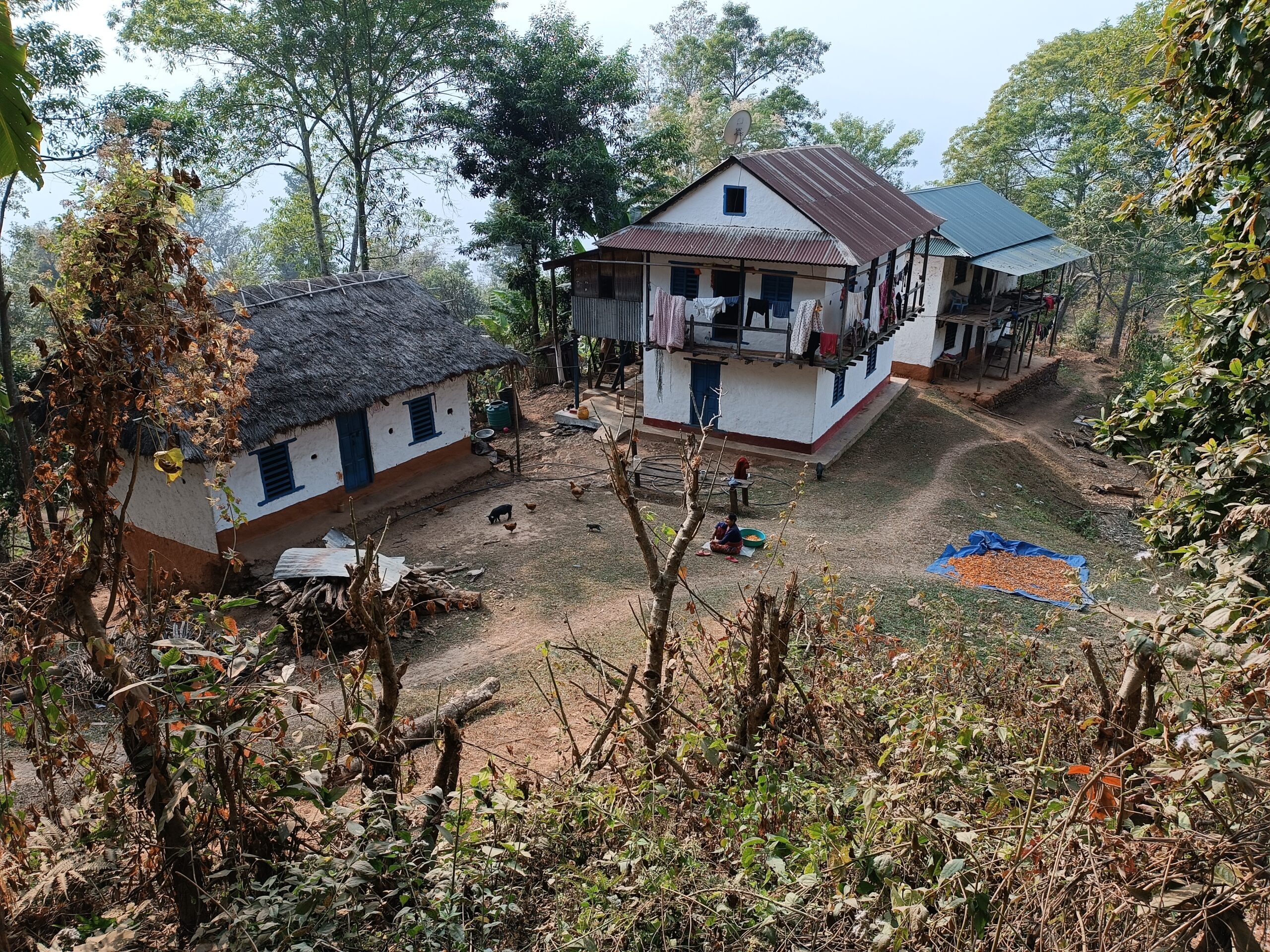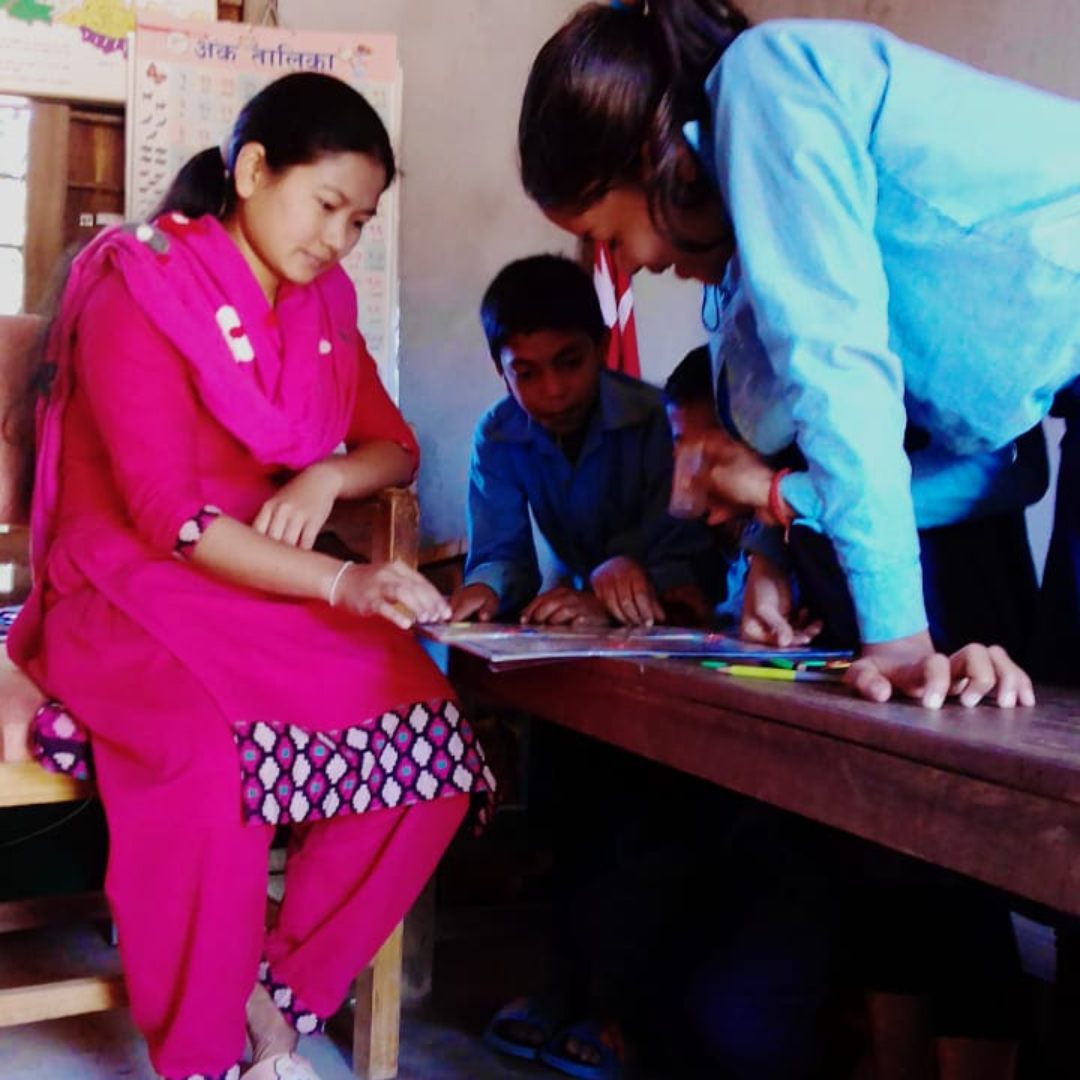Today, on International Day of Play, we’re joining a global movement to recognise something children instinctively know - and adults often forget:
Play is not a break from learning. Play is learning.
At UWS, we see this every day. When children play, they do more than laugh and move. They build confidence. They solve problems. They form relationships. They explore the world around them - and their place within it.
In the earliest years of education, play lays the foundations for lifelong learning. And in the remote communities where UWS works, it can be a game-changer (literally).
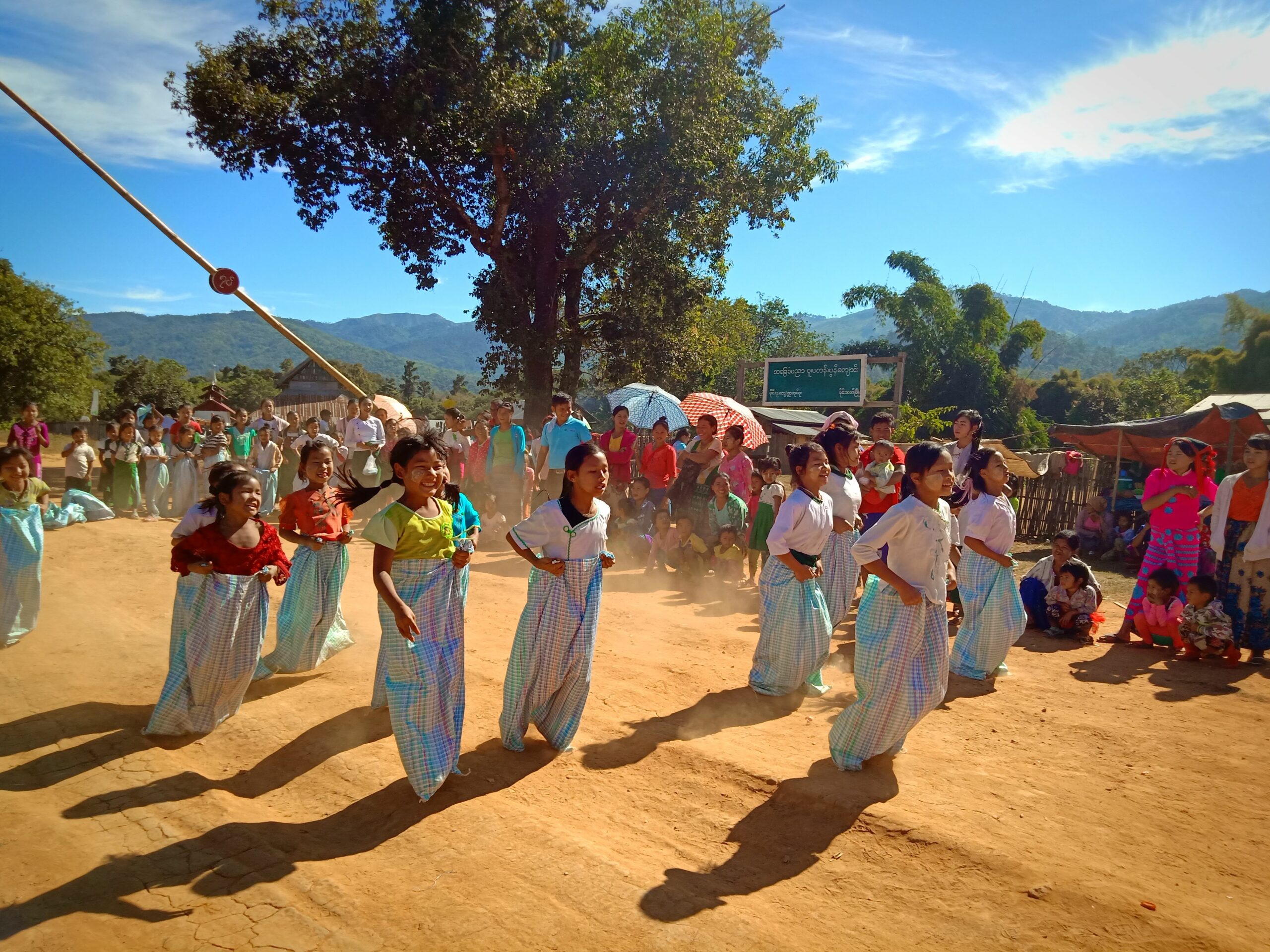
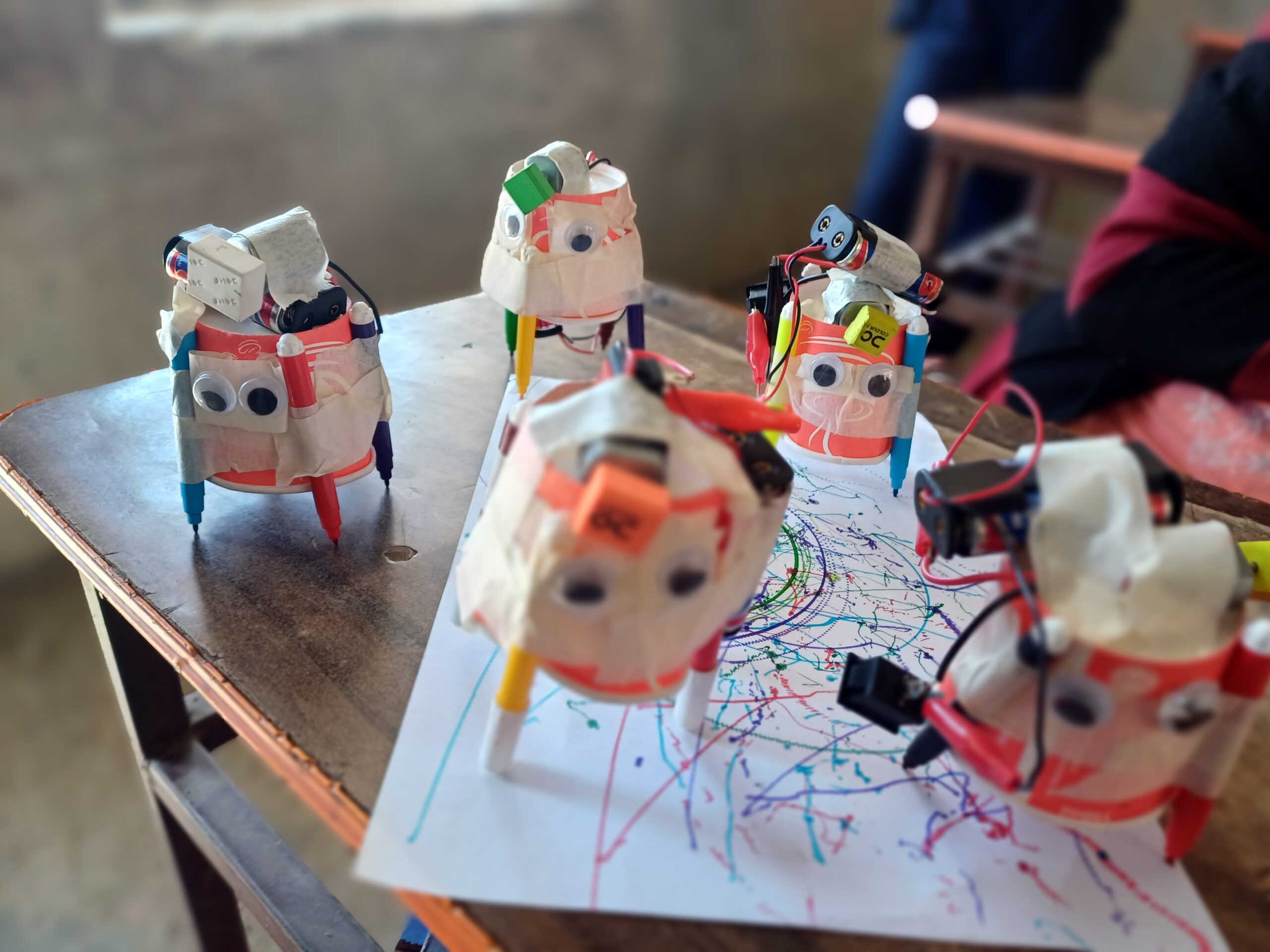
Learning Through Play
Play-based learning isn’t just about toys and games. It’s a powerful tool for developing literacy, numeracy, communication, and critical thinking skills - often without children even realising they’re learning.
At UWS, we integrate play into every school day in both structured and unstructured ways. Our teachers use:
- Games to reinforce maths and language
- Storytelling and songs to boost memory and comprehension
- Role-play and group activities to build social and emotional skills
Even break-time games like tag or football become lessons in teamwork, negotiation, and resilience.
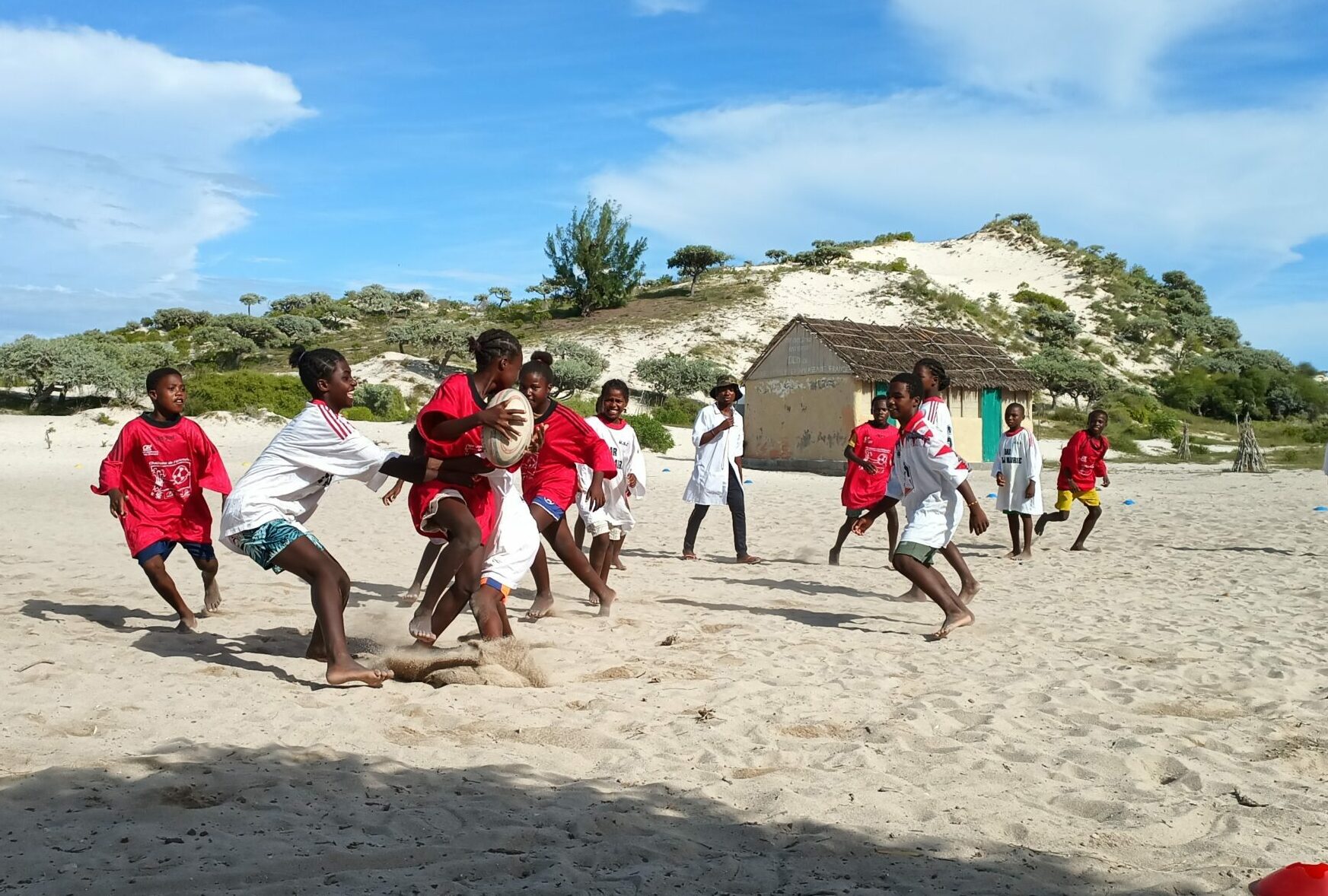
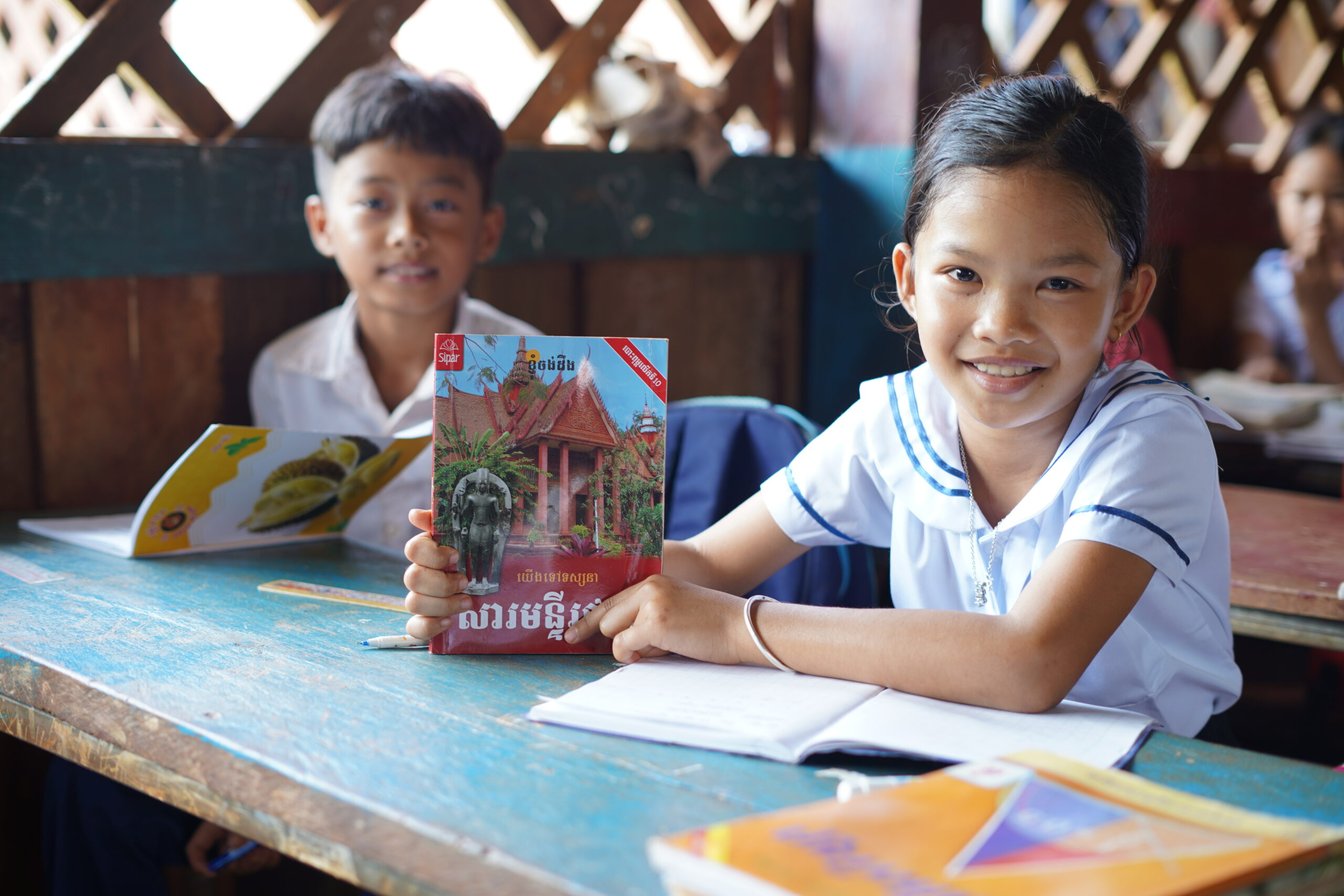
Serious Impact, Joyful Results
Research shows that play-based learning can boost early learning outcomes by up to four additional months on average (Evidence For Learning). This means children who engage in play-based learning tend to advance in their development at a faster rate.
Here’s what children gain through play:
- Boosted brain development, especially in the first 5 years
- Improved early literacy and numeracy outcomes
- Increased classroom participation and emotional well-being
- Strengthened memory, concentration and problem-solving
- Enhanced empathy, teamwork, and resilience
- A natural drive to learn through curiosity and exploration
Play is a serious task for children
Today we’re reminded that play isn’t a distraction from the “real” work of education. It is the work. Play turns classrooms into welcoming, safe spaces where children can express themselves, try new things, and learn with joy.
When children play, they don’t just imagine a different world. They begin to build one.
When we Educate The Future, we Change The Future
Excellence in Education
We are thrilled to announce that UWS Jaisithok School in Gulmi District, Nepal, has been recognised as the Best Primary School in Dhurkot Municipality!
This incredible achievement is a testament to the dedication of students, teachers, and the entire community, who have worked to make quality education a reality - empowering young minds and creating transformation in one of Nepal’s most underserved communities.
Join us in celebrating this milestone and the bright future ahead for the children of Jaisithok!
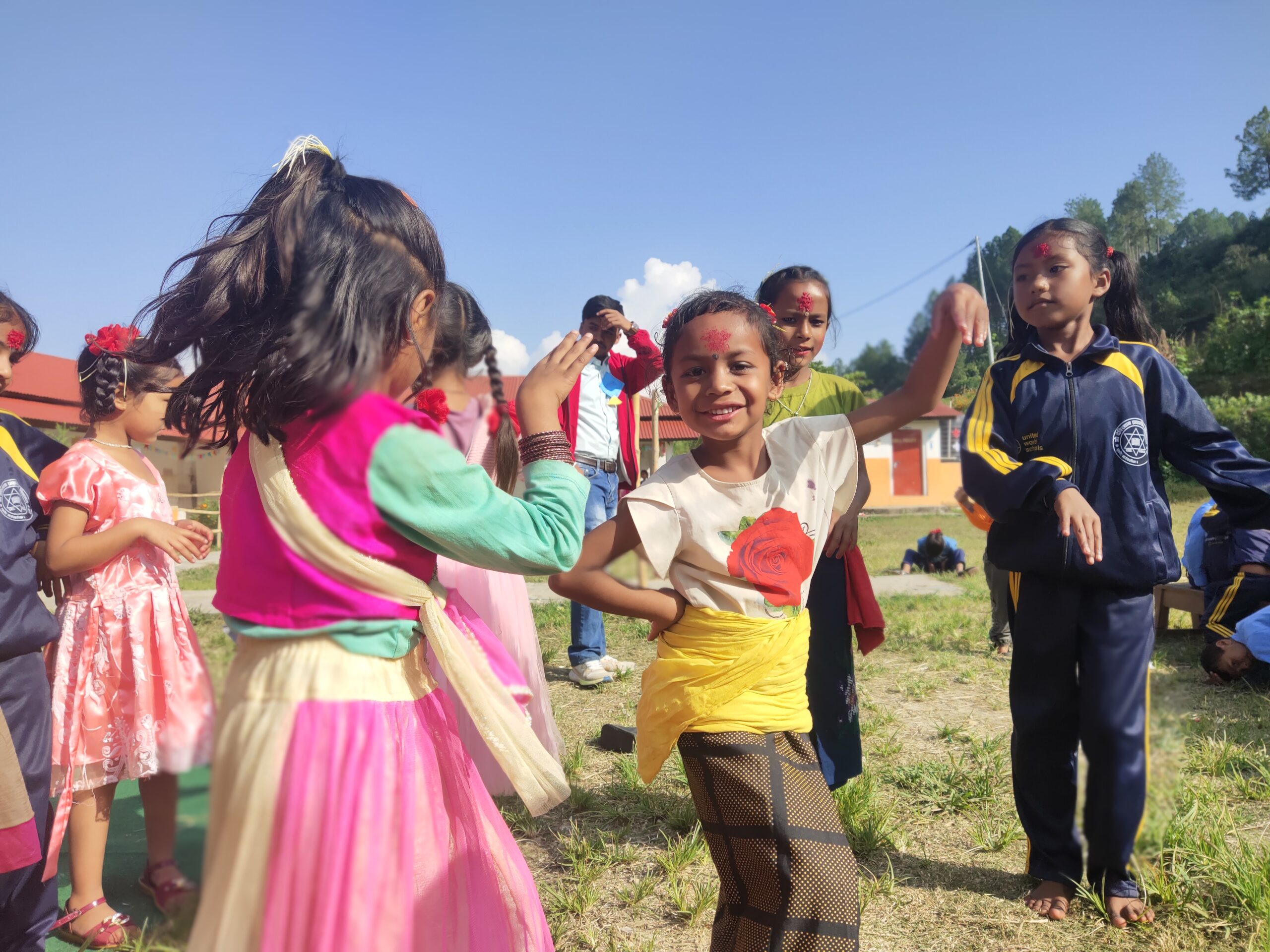
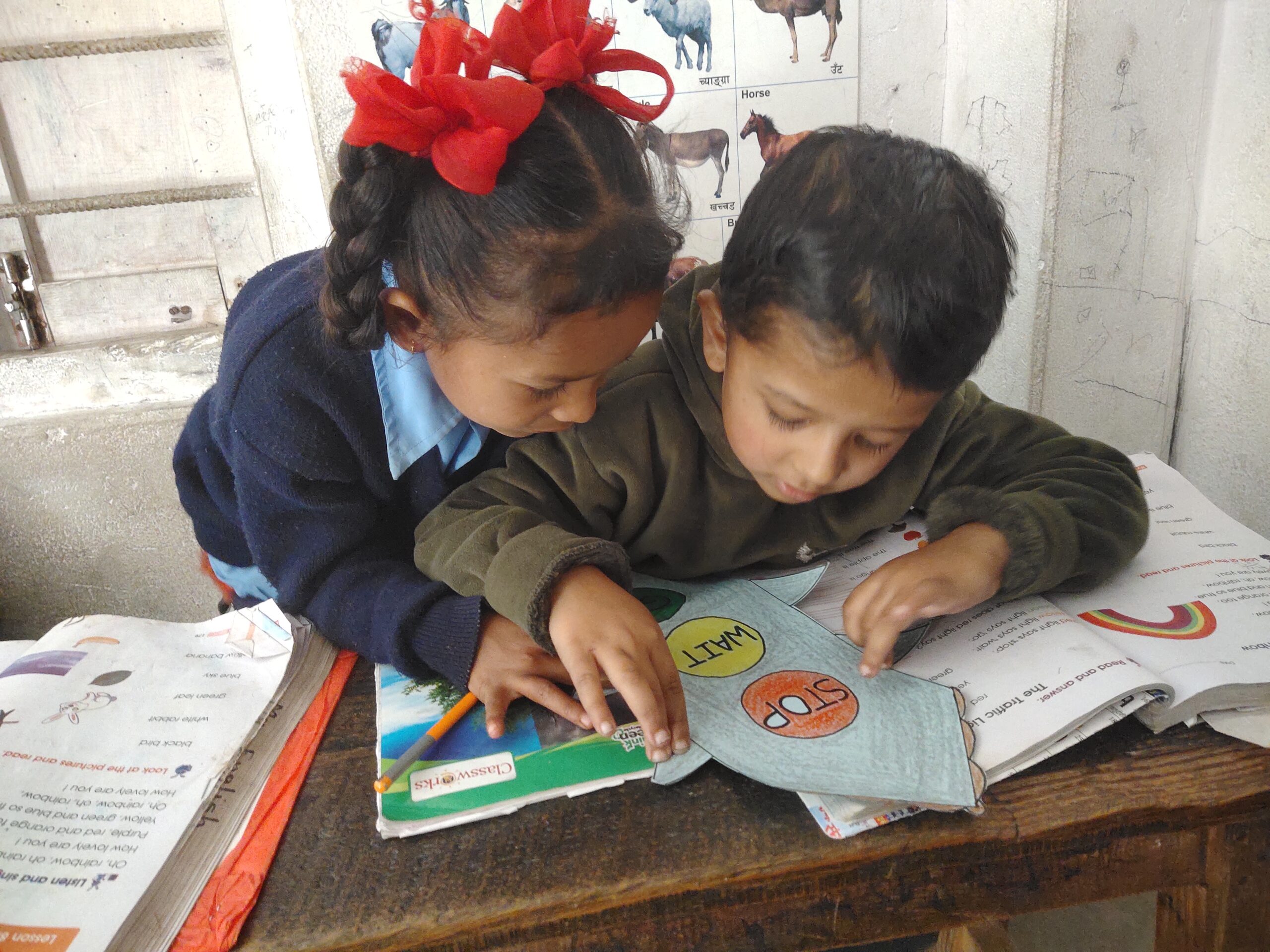
UWS Jaisithok School
In Nepal's remote communities, access to education remains a significant challenge. While the country has a 97% nationwide enrolment rate, the reality in rural areas tells a different story. Many government schools are located far from rural villages, forcing children to navigate challenging terrain to reach classrooms. As a result, only one-third of students who enrol in Grade 1 complete their primary education.
Jaisithok village, located in the mountains of central Nepal, faced these same challenges. Before UWS’ intervention, the nearest school was a 2-hour round trip from the village - a daunting journey for young students. Morever, illiteracy rates in the community were high, with only 1 in 4 people able to read, write and count.
At the request of the community, UWS began working on a solution to these challenges. In 2019, we constructed a new, earthquake-resilient school, UWS Jaisithok School, in partnership with local stakeholders. This provided a safe space for students to learn and thrive.
But our approach goes beyond simply building a school. At UWS, we are committed to creating sustainable educational ecosystems, where local leadership and community ownership drive the long-term success of educational initiatives.
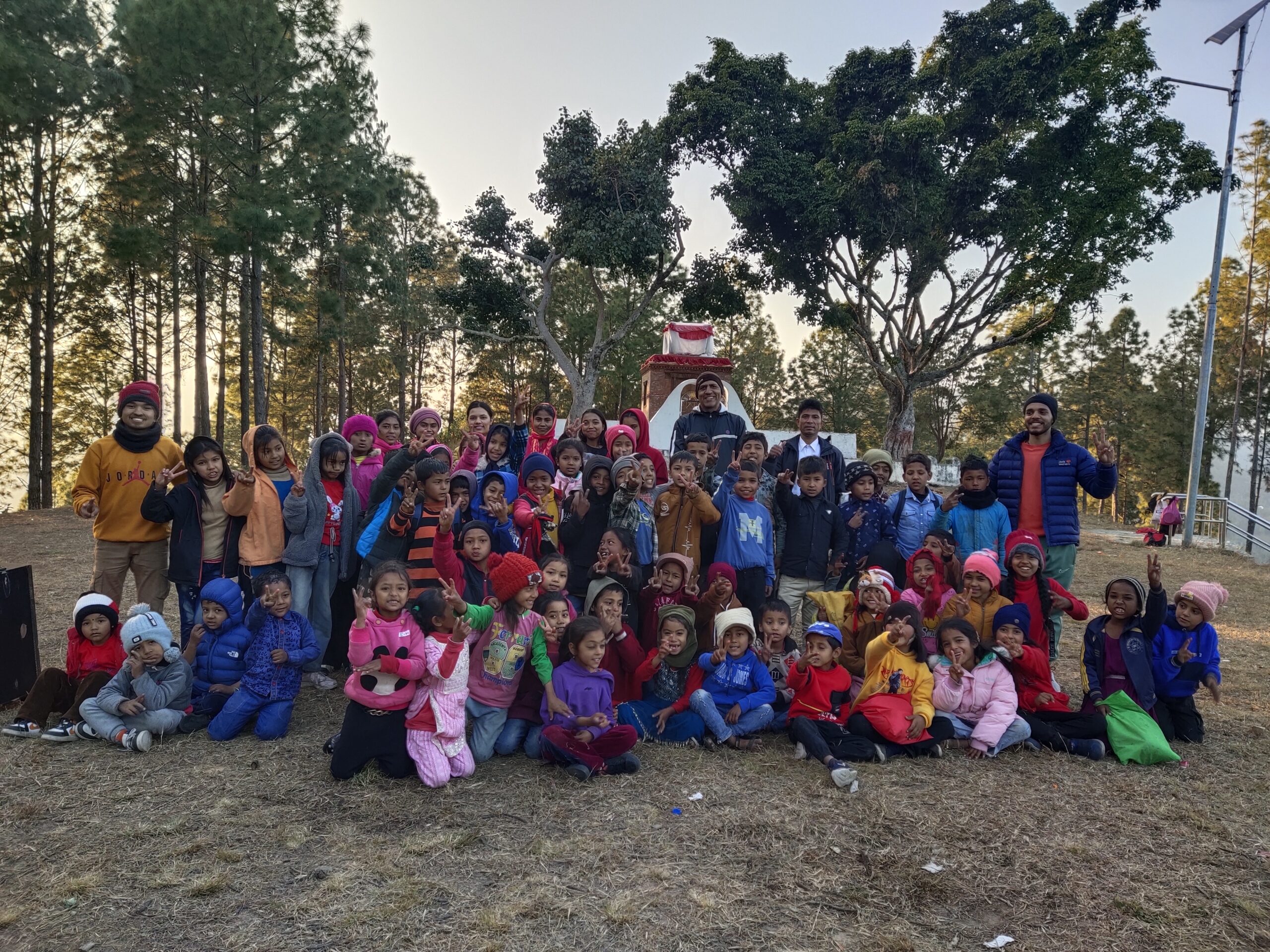
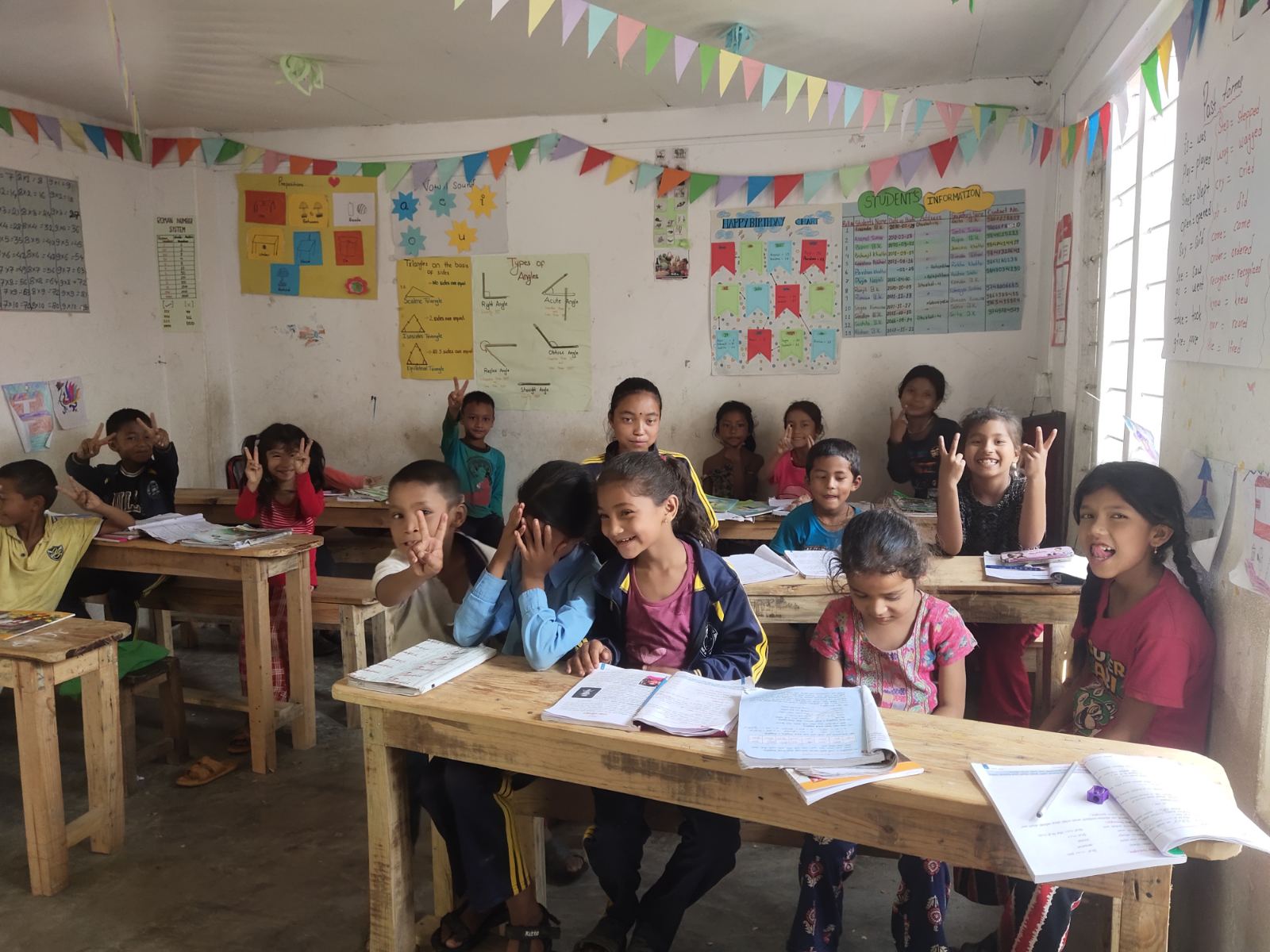
The Pillars of Success
At UWS, we understand that providing access to education is just the first step. Sustainability comes from empowering local communities to own and lead their educational systems. That’s why UWS is dedicated to driving strategic transitions - supporting communities to take charge of their own educational institutions. This transition is not just about handing over the reins to the community, but about ensuring they have the skills, resources, and support necessary to create a self-sustaining education system.
In 2024, UWS Jaisithok School successfully transitioned to local leadership. This means that the school is now fully managed by the local community and stakeholders. This transition is a critical milestone for both the school and the community, as it ensures that education in Jaisithok continues to thrive beyond UWS' direct involvement.
Celebrating the People Behind Jaisithok School’s Achievement
The recognition of UWS Jaisithok School as the Best Primary School in Dhurkot is not just the result of good teaching - but a direct reflection of the collective efforts of the community. Here’s a look at the people behind this achievement:
- Head Teacher & Educators: The vision and commitment of the head teacher and the dedicated teaching staff have been pivotal in creating an inclusive and engaging learning environment.
- School Management Committee (SMC): The SMC has been instrumental in shaping the school’s progress. Their role in effective governance, resource allocation, and strategic planning has been crucial in elevating the school.
- Students: The heart of this achievement lies with the students themselves. Their enthusiasm, hard work, and eagerness to learn have made Jaisithok School a thriving community which celebrates quality education.
- Local Community Members: Education thrives when a community comes together. Parents, guardians, and local leaders have actively supported the school by advocating for education, participating in initiatives, and fostering a culture where learning is valued.
This collective effort proves that education is not just about classrooms and textbooks - it’s about a community coming together to invest in the future of their children.
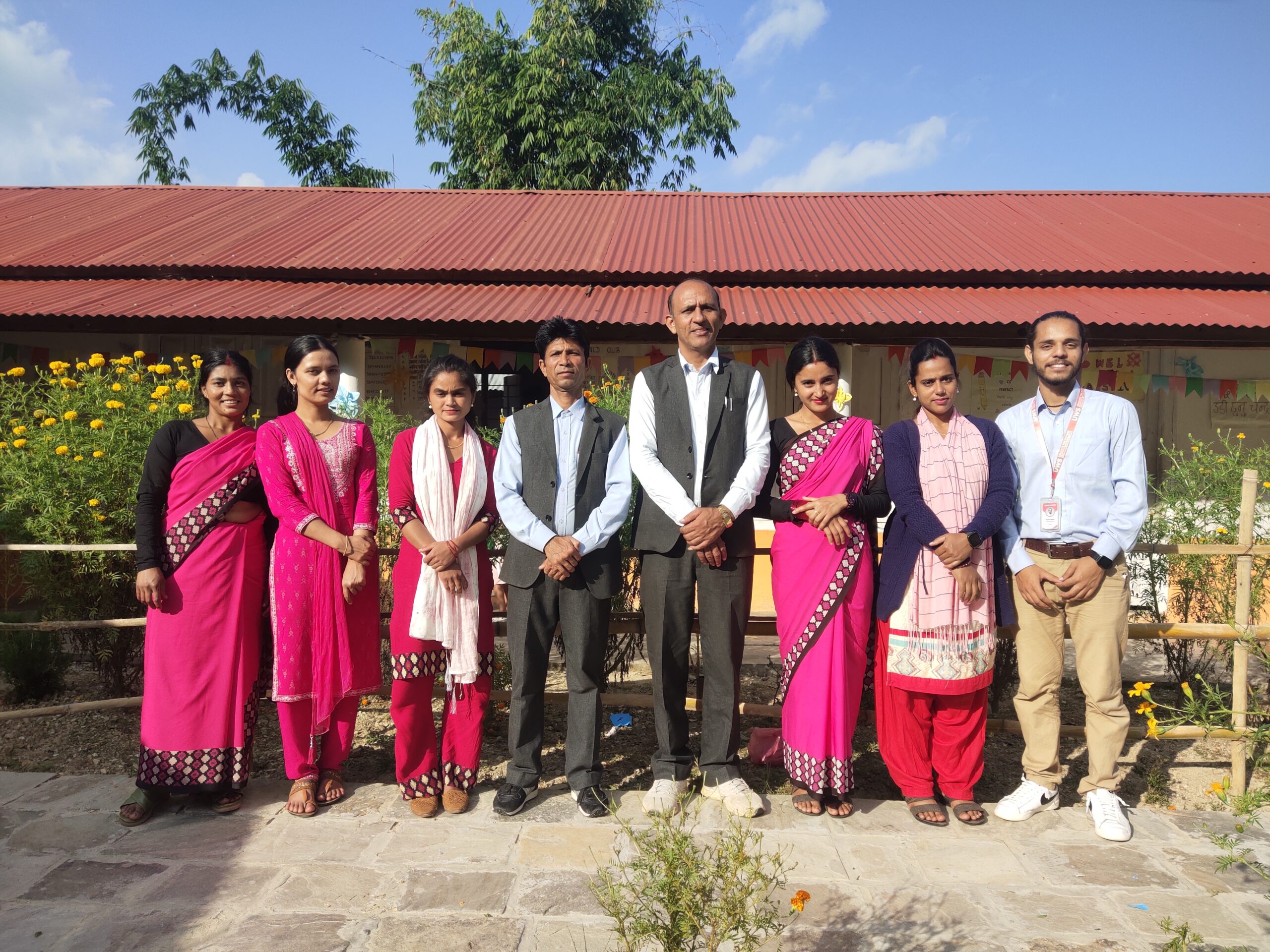
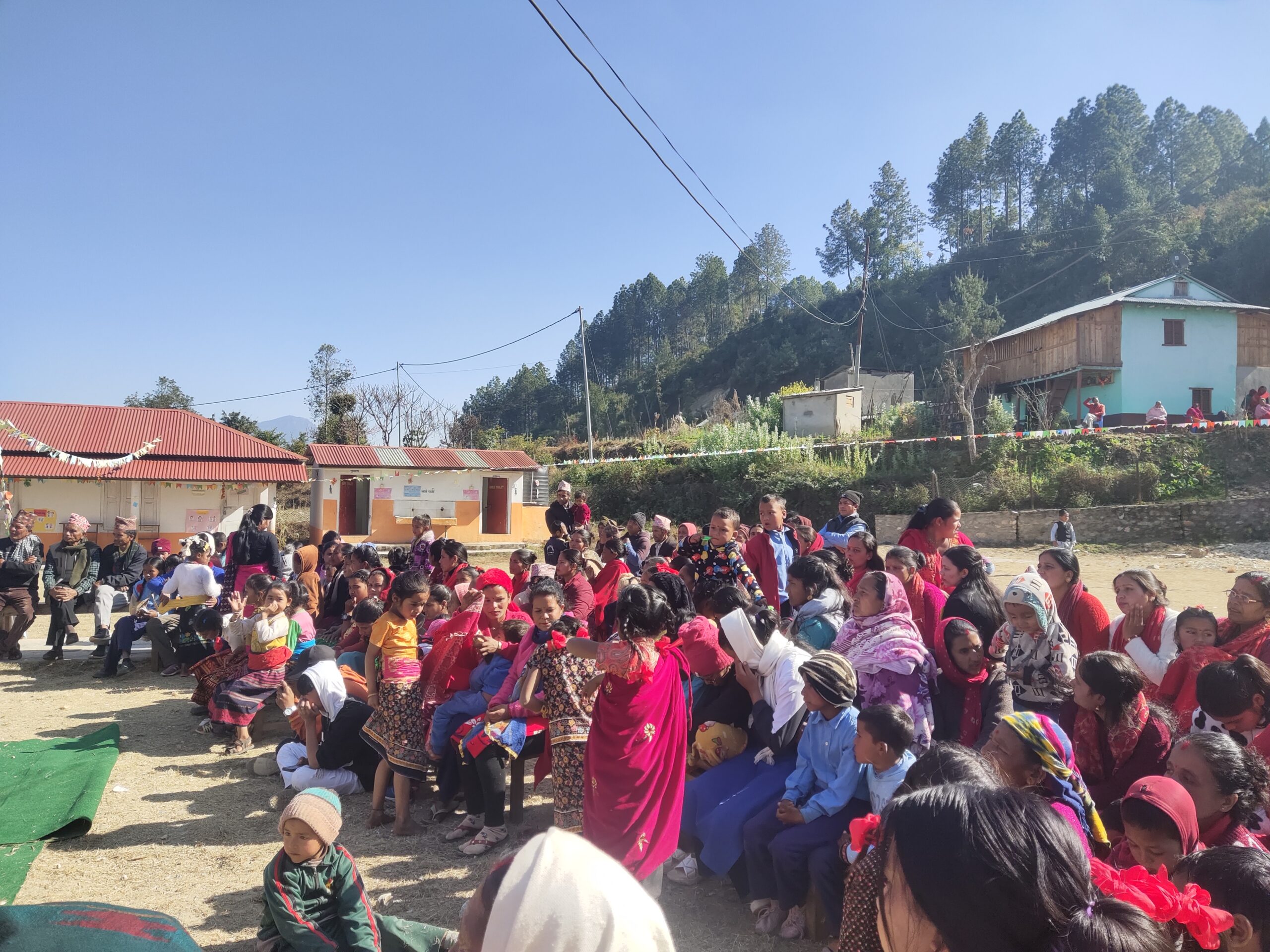
The Award’s Impact and Future Plans
The recognition of UWS Jaisithok School as the Best Primary School in Dukurkot comes with a USD 3,500 financial award. This recognition will drive meaningful improvements, as the Dhurkot Rural Municipality plans strategic enhancements to further elevate the quality of education. These funds will support infrastructure improvements, resource allocation, and innovative learning experiences, ensuring that students continue to thrive in a nurturing and well-equipped environment.
The success of UWS Jaisithok School is a testament to the power of local leadership and community-driven education. With continued dedication, innovation, and the support of our partners and communities, UWS will keep working to build brighter futures for children in Jaisithok, Dhurkot, and beyond.
Join us in celebrating this success and supporting the ongoing efforts to create a world where every child has the opportunity to learn, grow, and thrive.
Accelerating Action for Girls’ Education
In honour of International Women's Day, we're thrilled to feature a conversation with Davit Choun, the Gender Equality, Social Inclusion, and Safeguarding (GESSI) Specialist at UWS Cambodia. As a leader in advocating for gender equality in education, Davit shares insights into how UWS is driving change for girls and women, addressing deep-rooted barriers, and fostering inclusive, supportive learning environments in Cambodia’s most marginalised communities.
Q: Davit, can you start by sharing some of the most pressing challenges girls in Cambodia face when it comes to accessing quality education?
For many girls in Cambodia, education is not a guarantee. While progress has been made, girls - especially those in rural and indigenous communities - continue to face significant barriers. Deep-rooted gender norms, poverty, and systemic challenges make access to school challenging.
In the remote areas where UWS is working, traditional gender roles can prioritise boys’ education over girls’. Girls are often expected to take on household chores, care for siblings, and work on family farms. Poverty deepens these struggles, with many families unable to afford uniforms, school supplies, or transportation. Girls are often kept from school due to domestic responsibilities or early marriage.
Physical distance from schools is another barriers. For many girls, the journey to school is long, risky, and sometimes unsafe, leading to hesitation from parents to send them.
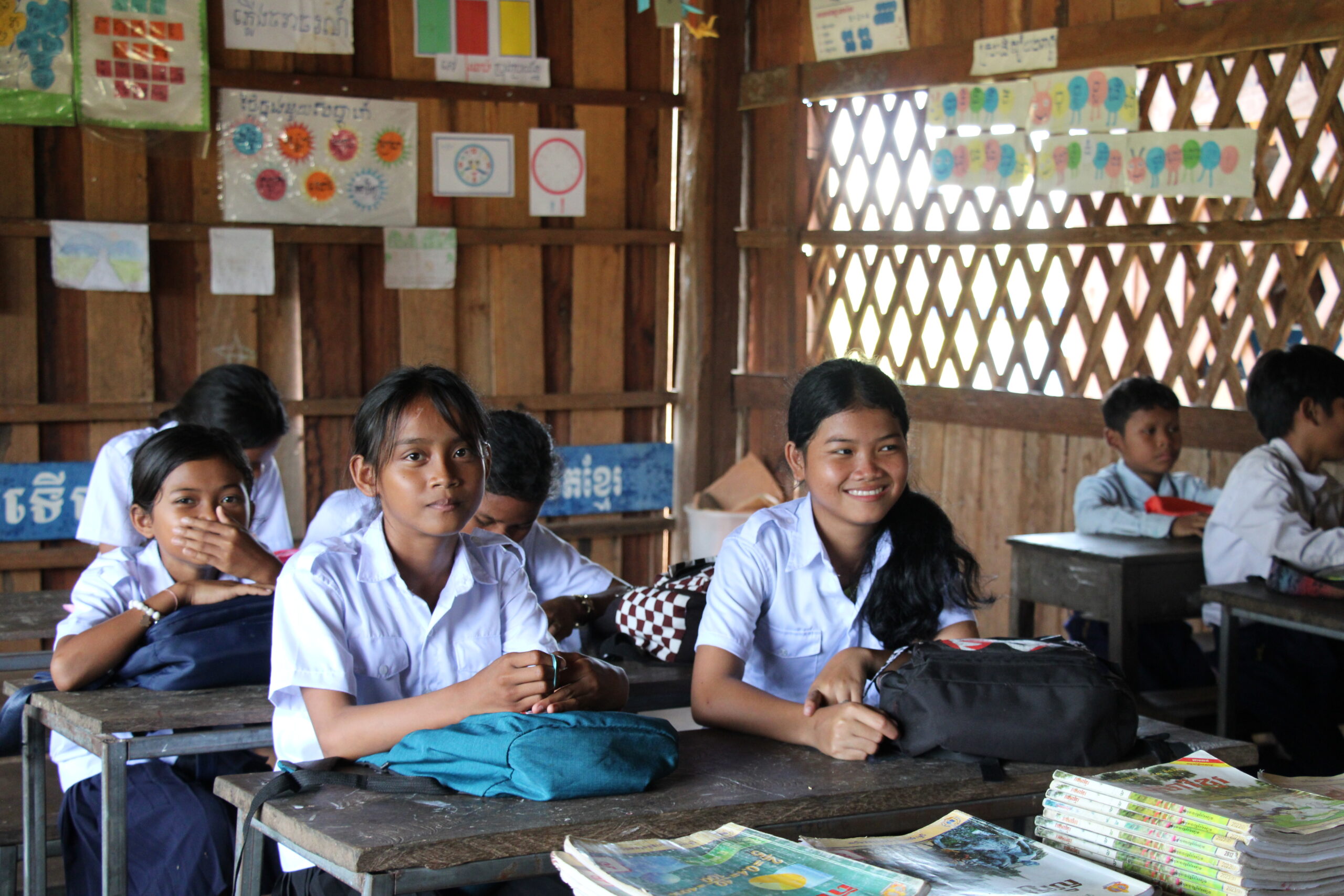
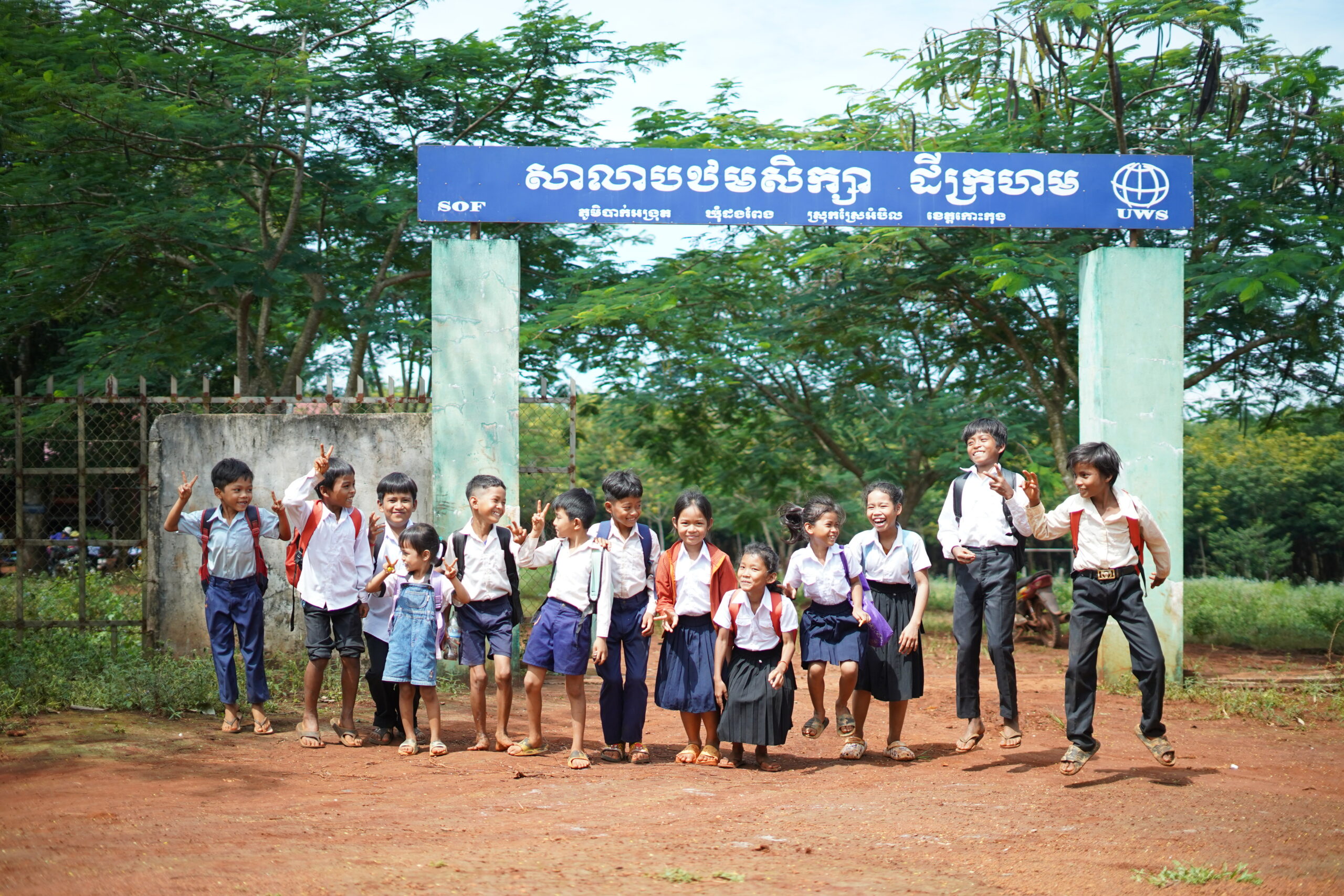
Q: What strategies has UWS Cambodia put in place to support girls’ education and address these gender disparities?
Our solutions must be holistic and multi-layered. UWS Cambodia works closely with local communities to raise awareness and promote a more inclusive educational culture through community workshops, advocacy, and discussions with parents.
Ensuring that schools are physically safe for girls is a priority. We focus on improving school infrastructure by providing gender-friendly WASH facilities, menstrual hygiene support, and child protection policies to create a secure environment where girls feel supported.
A critical component of our approach is training teachers to adopt gender-responsive methods that challenge stereotypes and unconscious biases. This encourages both boys and girls to participate equally in classroom activities. We also work closely with the Cambodian government and local organisations to ensure that girls’ education remains a national priority.
Q: Community engagement is a vital part of UWS’ approach. How does UWS engage local communities to promote gender equality?
Local communities are central to creating lasting change. We involve parents, leaders, and other key stakeholders in every step of the process. We hold meetings and workshops to raise awareness about the importance of girls' education. We collaborate with other NGOs to conduct campaigns promoting girls’ enrollment.
UWS Cambodia encourages parents to take active roles in school management and educational decisions. Through our Mothers’ Groups, parents receive the knowledge and support they need to advocate for their daughters’ education. Empowering mothers and including them in decision-making leads to generational shifts in attitudes toward education. Engaging fathers and village leaders also plays a key role in creating male allies for change.
Additionally, we’ve formed Girls' Clubs in schools, offering a safe space for girls to voice concerns, build confidence, and advocate for their needs.
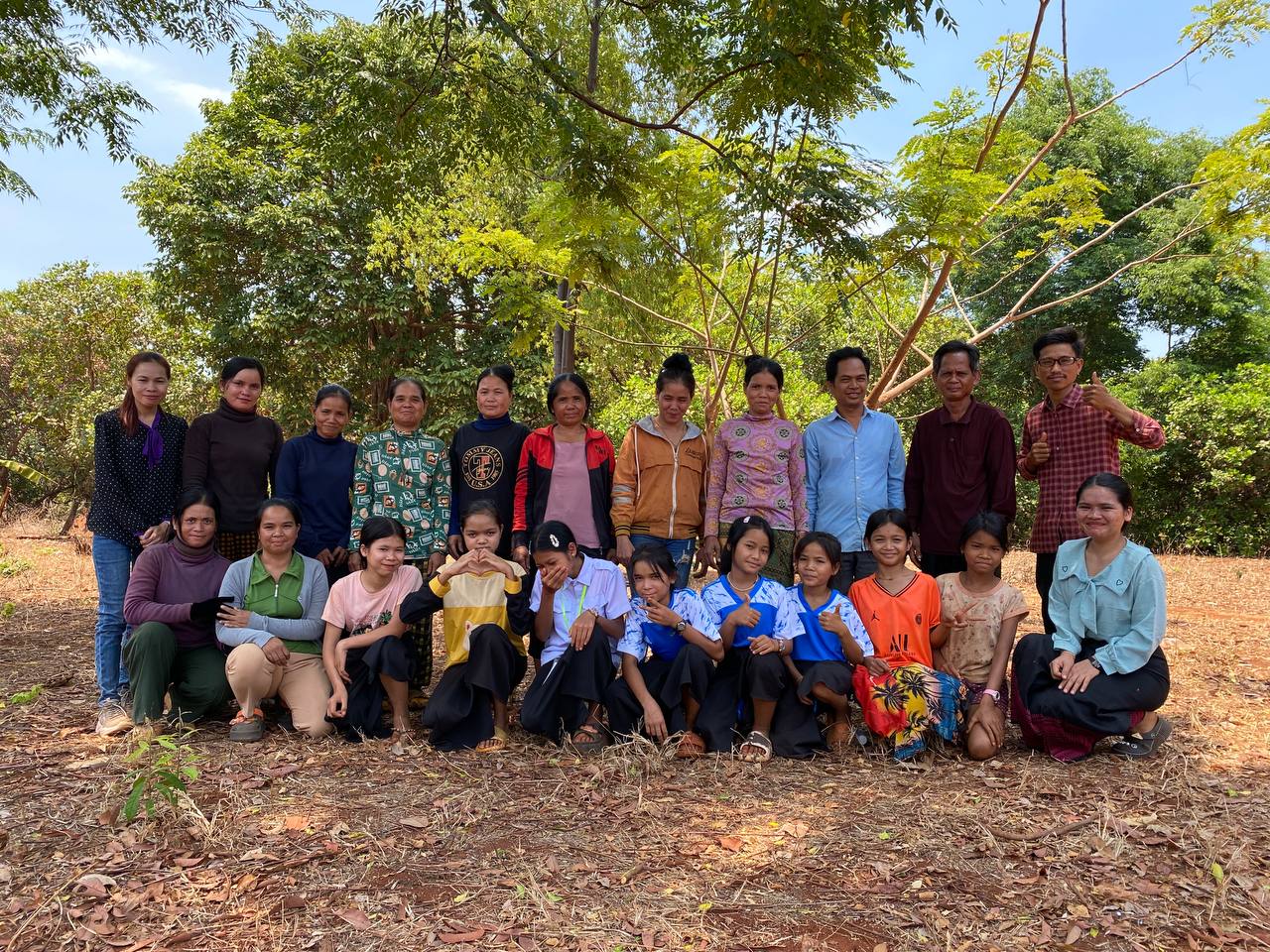
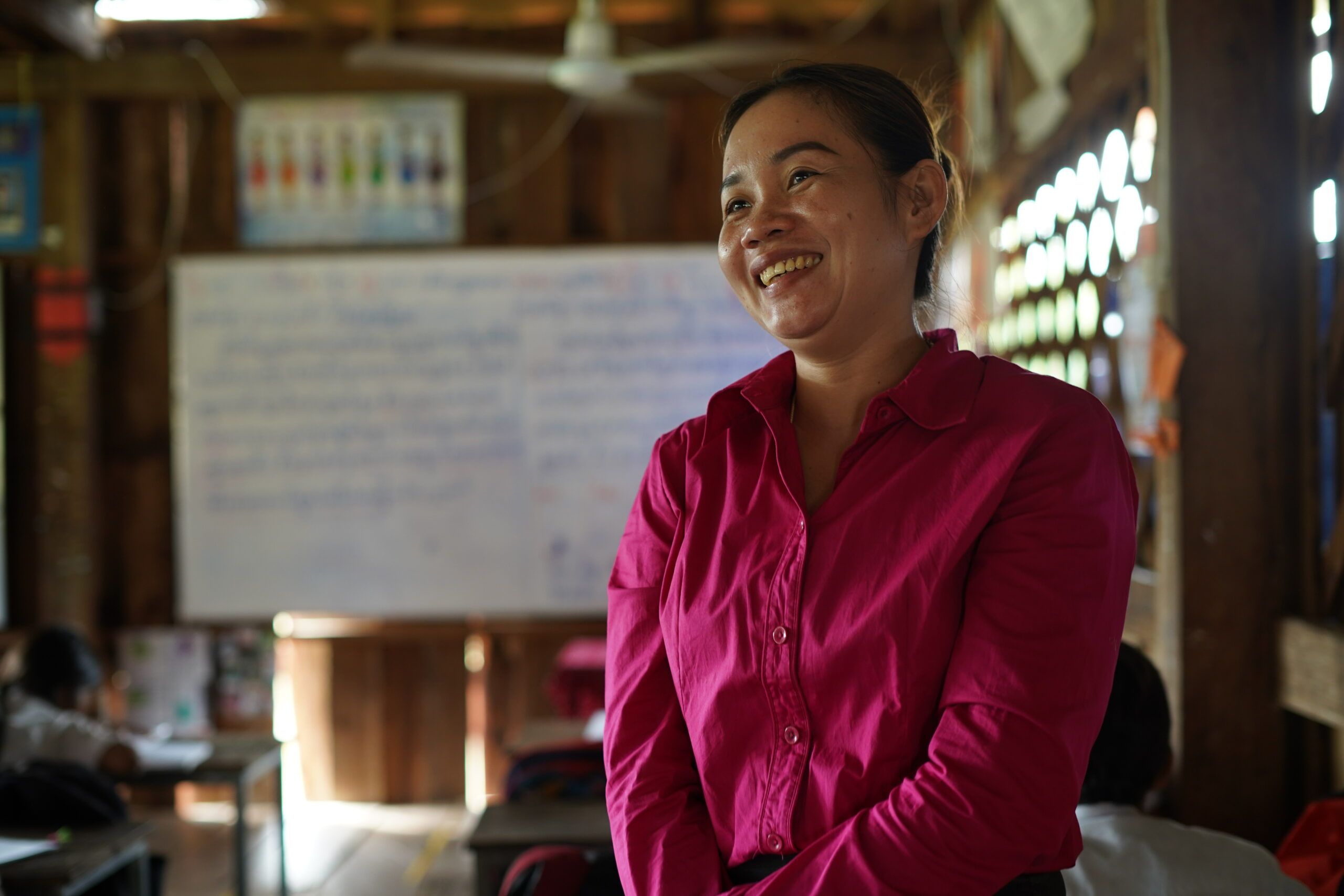
Q: How are UWS’s teacher training programs helping create more inclusive classrooms?
Teachers are instrumental in shaping how children view themselves and each other, which is why UWS provides extensive training in gender-responsive teaching practices. Teachers are trained to be aware of and actively challenge gender stereotypes that may affect the way students engage with subjects or participate in class. For example, we challenge the assumption that boys should be better at maths or science and girls at literature or home economics. Our teachers encourage both boys and girls to participate equally in discussions, activities, and leadership roles.
Moreover, creating a safe, supportive environment is essential for encouraging children to stay in school. Teachers are equipped to identify and address gender-based violence, bullying, or child abuse, and trained in protocols to support students. Our teachers are taught how to create a supportive environment where students feel comfortable reporting any issues. UWS also continually monitors how teachers apply gender equality principles in their classrooms. This ensures that the training leads to real, measurable change.
Q: Tell us about the impact of the Mothers' and Girls' Clubs in Cambodia. What have they achieved in terms of social and educational change?
The Mothers' and Girls' Clubs are at the heart of UWS’s efforts to empower women and girls. These clubs don’t just promote education; they create leaders - girls who stand up for their rights and mothers who advocate for gender equality.
Mothers’ Clubs focus on providing mothers with the knowledge, skills, and support they need to improve their children's education and to understand the long-term benefits of educating their daughters. In communities where early marriage and child labour are prevalent, these clubs help mothers recognise the importance of keeping girls in school. Girls' Clubs are equally powerful. They offer girls a platform to discuss their challenges, build leadership skills, and learn about their rights. They are also taught decision-making skills and how to resist social pressures like early marriage or gender-based violence.
Thanks to these clubs, more girls are enrolling and staying in school. Currently, 11,137 students are enrolled in UWS schools in Cambodia, 48% of whom are girls. In the last academic year, UWS Cambodia saw a 92% pass rate for girls in the final primary school grade. These clubs have improved educational outcomes and changed social attitudes, with more parents supporting their daughters' education and girls becoming leaders in their communities.
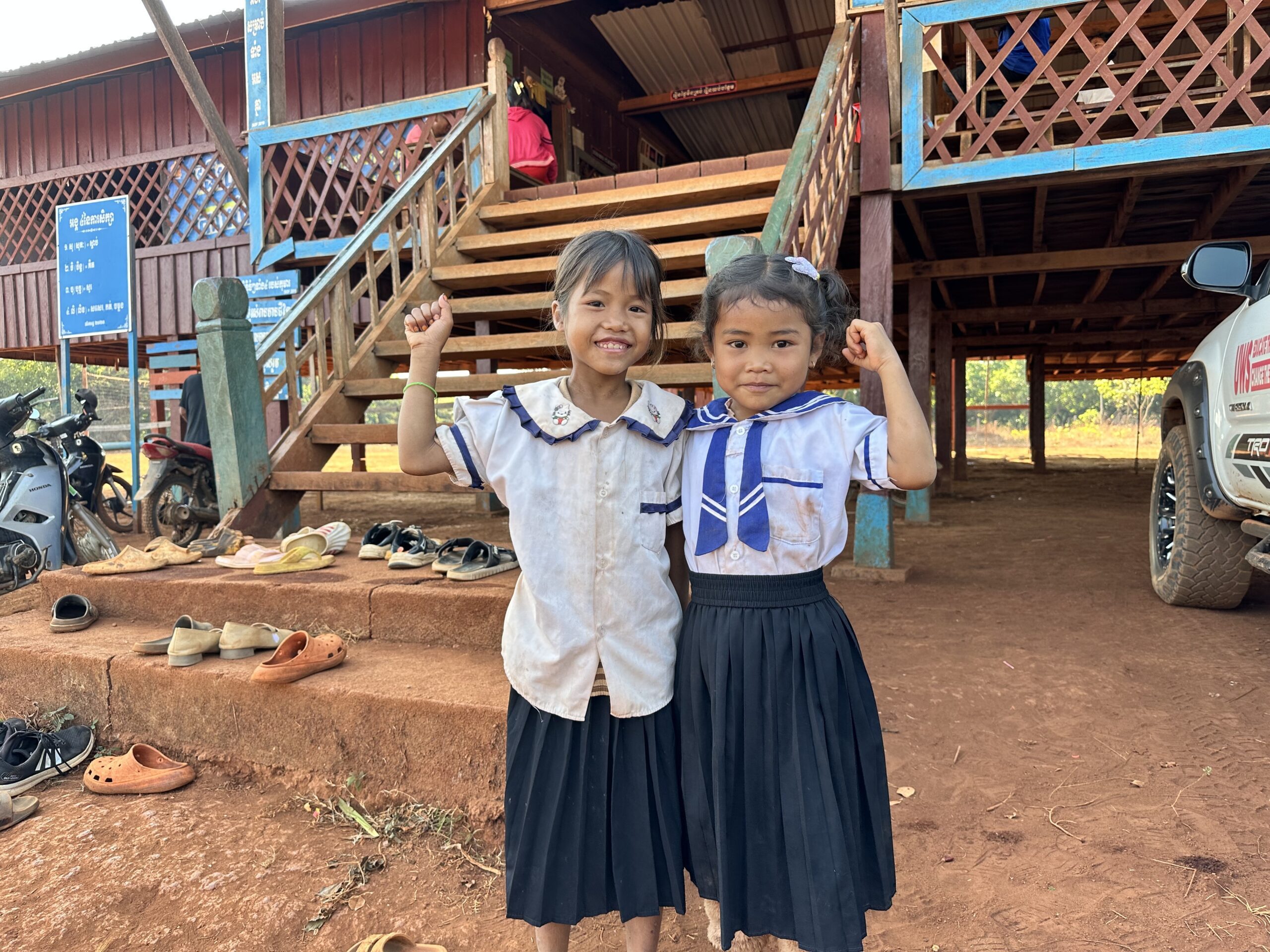
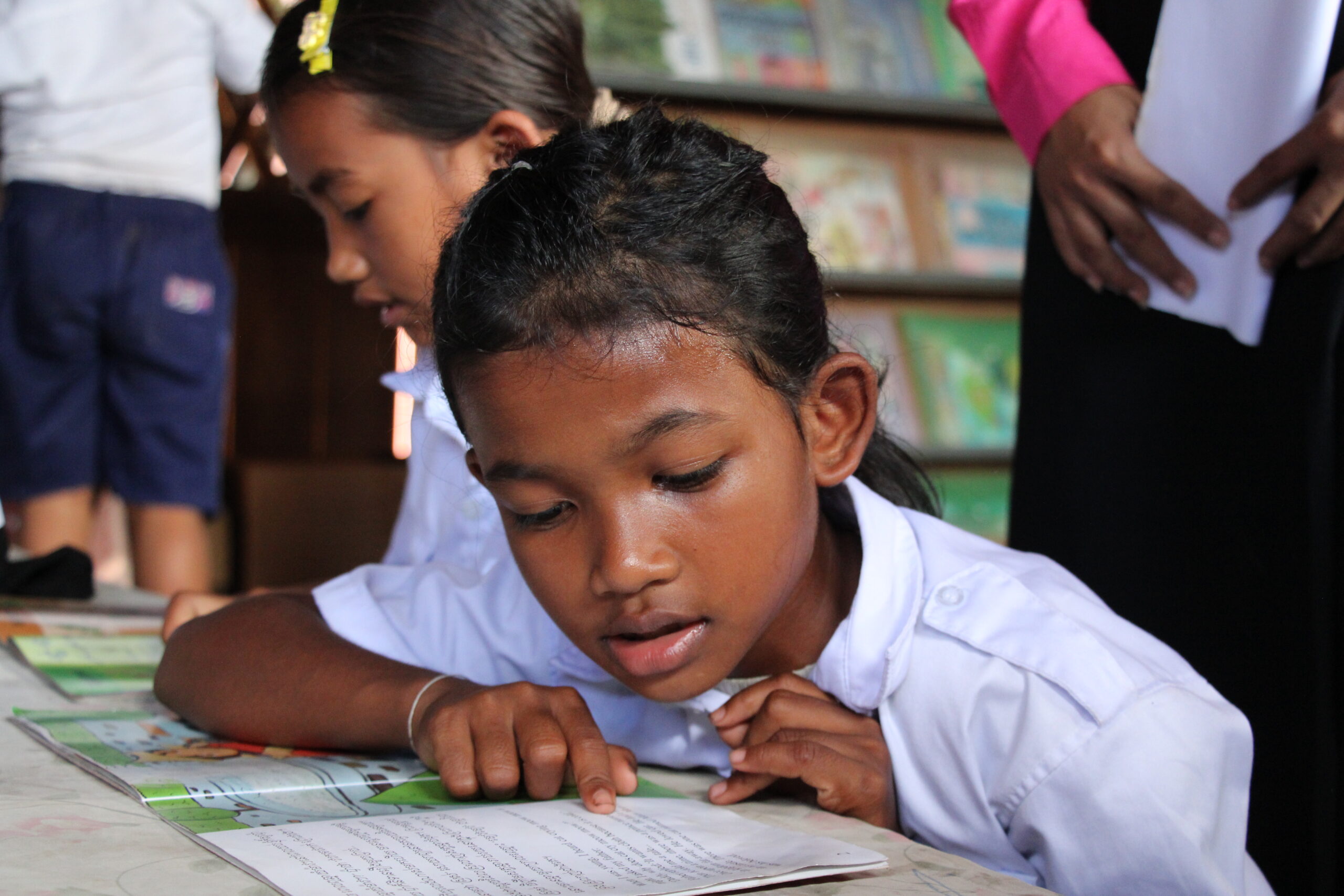
Q: Looking ahead, what are the next steps for UWS Cambodia in accelerating gender equality and inclusion in education?
Accelerating action for gender equality means going beyond awareness. UWS Cambodia is committed to expanding its impact to ensure every girl has access to safe, quality education. By continuing to build and support safe, gender-responsive schools, UWS will ensure that girls have a secure environment in which to learn and thrive, free from the risks of exploitation or early marriage. Our school environments will not only focus on physical safety but also address emotional well-being with ongoing support to provide girls with the confidence and skills needed to stay in school and pursue further education.
UWS Cambodia will continue to support teachers on gender-responsive teaching, inclusive education practices and child protection and safeguarding. By deepening the training of teachers to recognise the unique needs of girls, children with disabilities, and other marginalised groups, UWS can accelerate action toward inclusive classrooms where every student feels seen, heard, and respected.
Lastly, a key strategy for accelerating gender equality is ensuring that more women enter and remain in the teaching profession - to promote female role models for the girls. UWS will continue to focus on recruiting and retaining female teachers and advocating for policies that support their inclusion in the education sector, particularly in communities with low female teacher representation.
Q: Finally, what message do you have for International Women's Day 2025?
International Women's Day is a reminder that accelerating action for gender equality means more than just raising awareness. It means taking concrete steps to break down barriers, challenge cultural norms, and create opportunities for girls and women to thrive.
At UWS, we are committed to ensuring that every girl has access to a quality, safe education. Together, we can build a future where every girl is empowered to lead and make her dreams a reality.
For generations, girls in remote communities of Nepal and Cambodia have faced major barriers to education due to cultural norms, poverty, and limited resources.
As a result, many are vulnerable to early marriage, domestic labour, and economic hardship. The statistics are stark: globally, 129 million girls are out of school, with 12 million married before 18 each year (UNICEF, 2023). In Nepal, 40% of girls marry before adulthood (Human Rights Watch, 2023), while rural female literacy in Cambodia lags far behind urban rates (UNESCO, 2023). These statistics are more than just numbers—they represent lost potential, stolen childhoods, and generations of women held back from economic independence.
Thanks to the Girls Will Be Girls project, delivered in partnership with the UK Government, this cycle is being broken in Nepal and Cambodia. This project, which began in April 2023, builds on the momentum of our 2022 Girls Will Be Girls appeal, which was backed by the UK government as part of the UK Aid Match initiative. As we approach the two-year mark, we want to share the incredible impact we're witnessing.
Through mentorship, community engagement, and safe learning spaces, the program has empowered 11,793 students and is on track to reach 12,280 students by the end of the project. But beyond the numbers, the heart of this initiative lies in the stories of the people making an impact every day—parents, students, educators, and local leaders who are shaping a new reality for girls in their communities.
Let's take a behind-the-scenes look at what's happening and hear the voices of the individuals making a real difference.
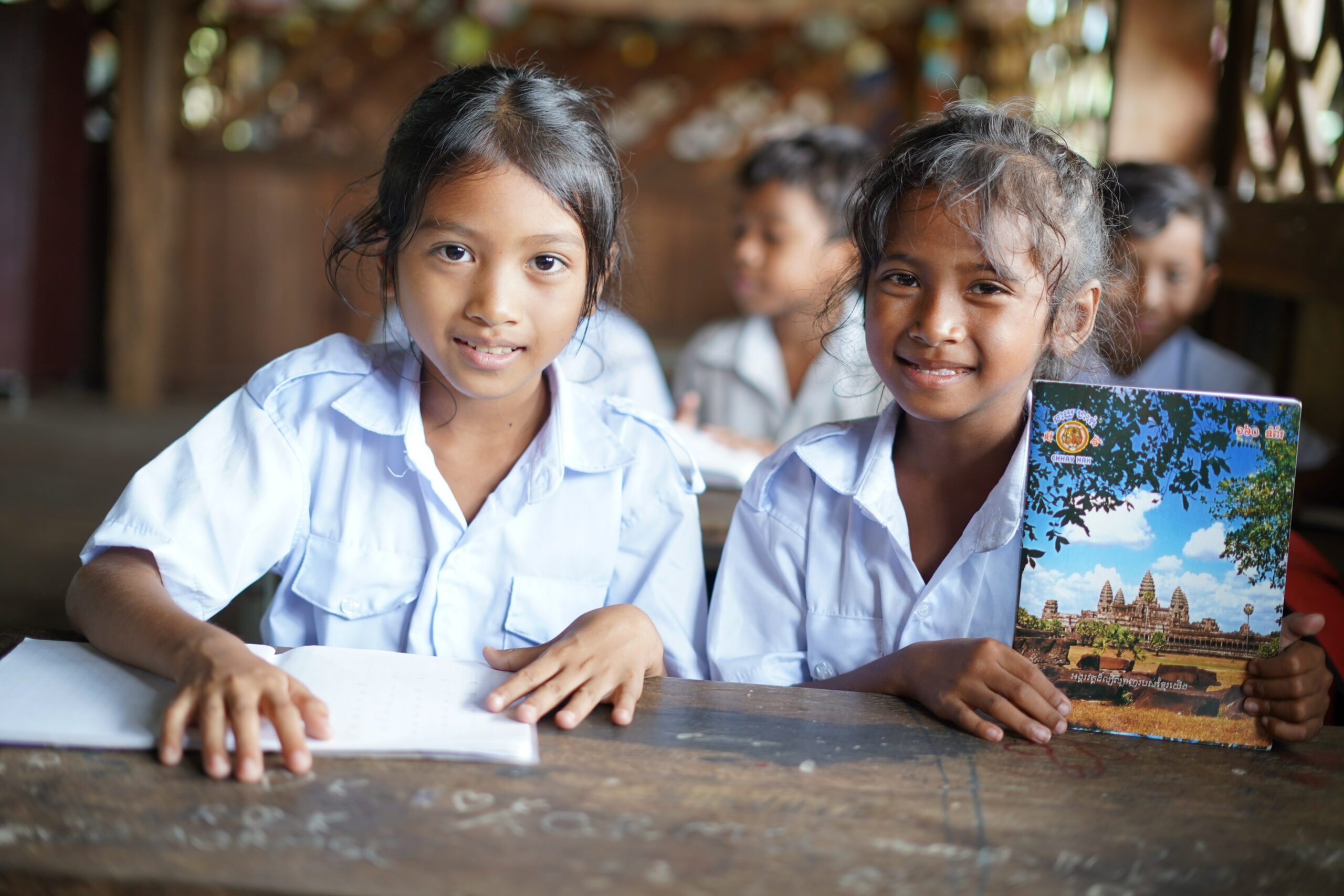
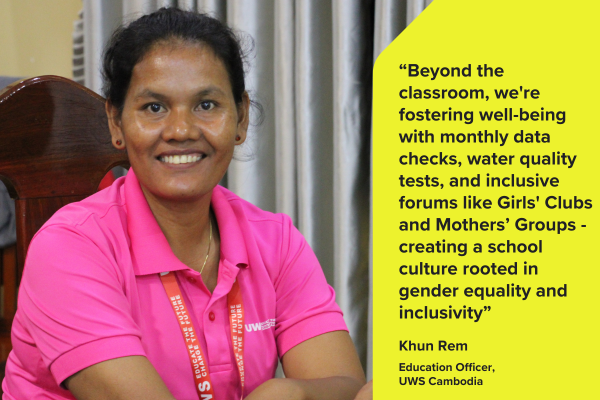
Creating Gender-Responsive Schools
A truly inclusive school is one where every child feels supported, safe, and empowered to pursue their aspirations. Through teacher training, gender-responsive lesson planning, and safe school environments, we are fostering learning spaces where girls can thrive.
Khun Rem, Education Officer at UWS Cambodia team, mentions:
“Beyond the classroom, we’ve launched initiatives to safeguard the well-being of both students and staff. From monthly data collection and water quality assessments to organising Girls' Clubs, Mothers’ Groups, and discussion forums for boys and girls, we are building a school culture that prioritises gender equality and inclusivity at every level."
For Jayanti Rai, School Mobiliser at UWS Nepal this mission is deeply personal.
“Training teachers in gender-responsive teaching methodologies, combined with classroom observation and constructive feedback, has significantly improved how boys and girls are treated equally. Equal participation in classroom activities, guided by trained teachers, has fostered a culture of inclusivity that I never experienced during my own school days.”
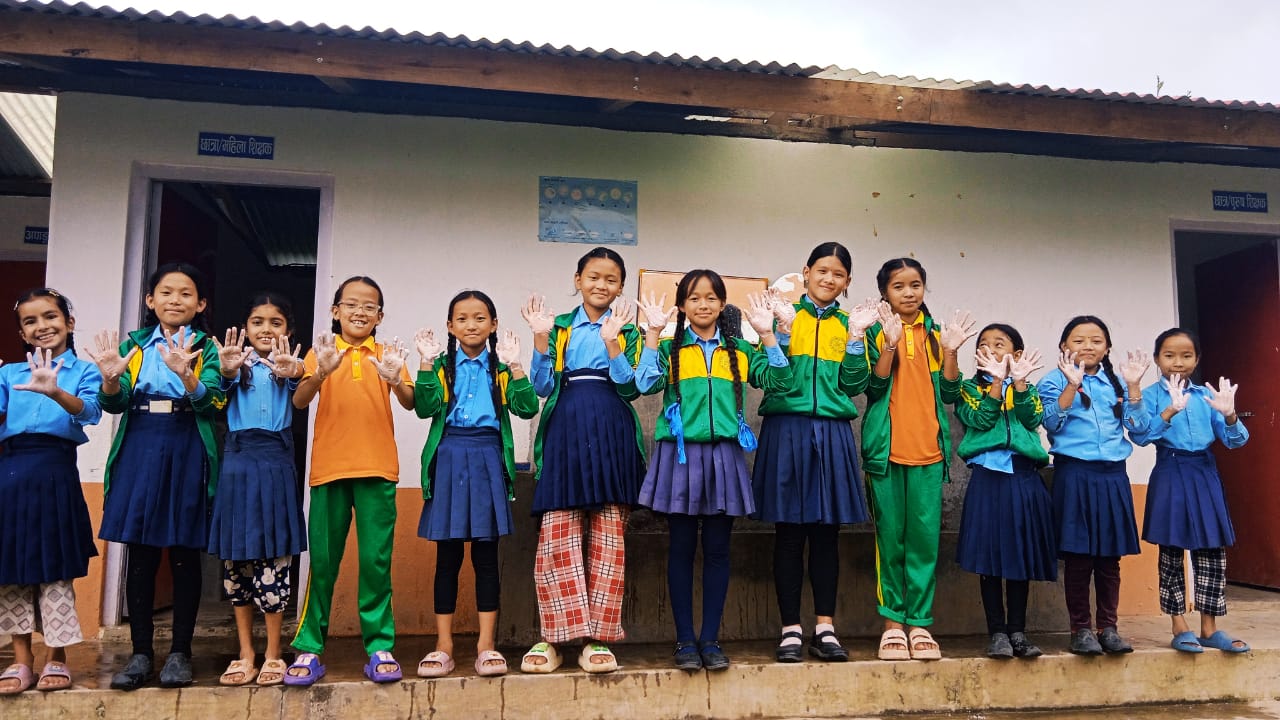

Mobilising Gender-Responsive Communities
Research shows that a child with a literate mother is 50% more likely to live past the age of five. At UWS, we recognise that education begins at home, and community involvement is essential in breaking the barriers that hold girls back.
As part of this project, community workshops, mothers’ meetings, and school support committees, are increasing local support for girls’ education. Additionally, Girls’ Clubs serve as safe spaces where girls build confidence, decision-making skills, and knowledge of their bodies and rights.
In UWS Rambeni, the Mothers’ Group, led by Sumitra Dungana, has played a pivotal role in ensuring that girls stay in school.
“The One Day, One Parent program has given parents a reason to step into their children’s world of learning. Through this, we have built stronger school-community ties, and harmful superstitions that once kept girls out of school are fading.”
For students like Bina, an eighth-grade student and Chairperson of the Girls’ Club at UWS Khamare, the impact is life-changing.
“It’s not just a group—it’s a platform where we discuss our challenges, from child marriage to gender discrimination, and find solutions together. We’ve learned life skills, engaged in advocacy, and grown more confident in voicing our rights.”
Rita from UWS Madamsingh shares how peer support makes a difference.
“Girls’ Club has been instrumental in helping us build self-confidence and express ourselves openly and effectively in front of others, fostering both personal growth and a sense of collective responsibility. We use interactive games and discussions to ensure every girl stays motivated to attend school. Seeing our friends push past societal expectations to prioritise their education is inspiring.”
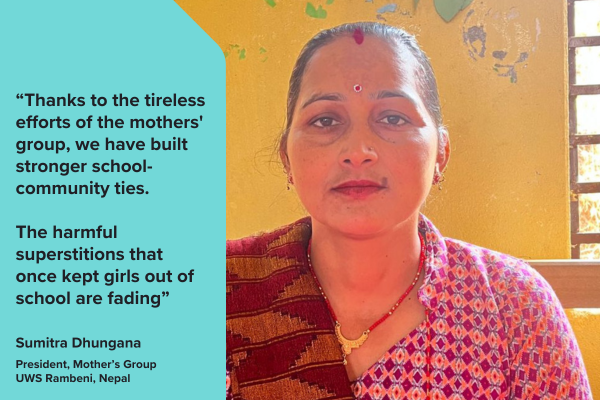
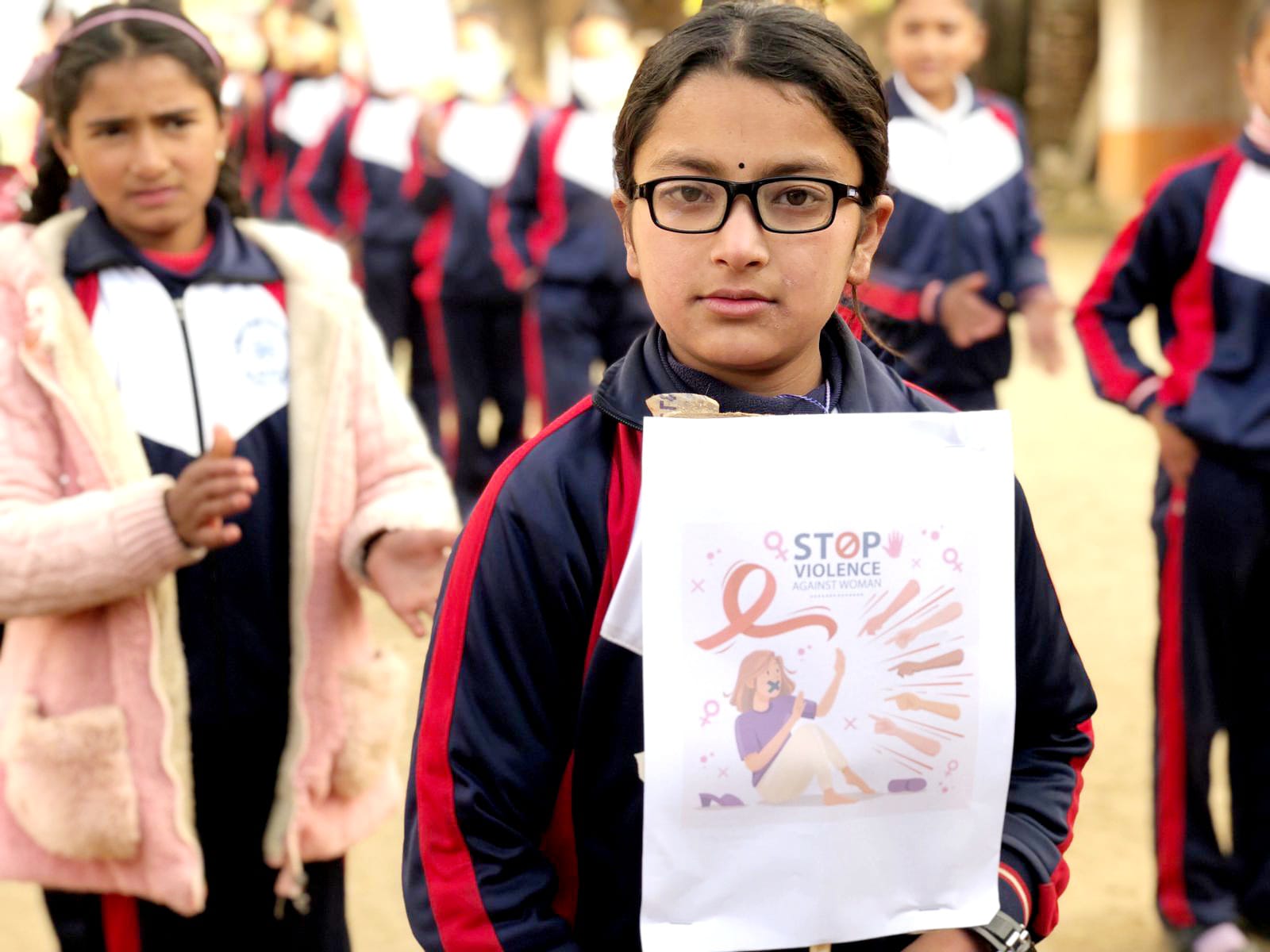
Strengthening Gender-Responsive Education Systems
Ensuring girls’ presence, participation, and achievement in school requires systemic transformation. Our work engages government officials and education sector stakeholders to improve gender-responsive teaching practices and school environments. This means advocating for inclusive policies, raising awareness of harmful gender norms, and fostering support for girls’ education at a national level.
At the municipal level, leaders have also witnessed this shift.
“After the introduction of UWS’s educational programs, there has been an increase in the sense of responsibility and leadership skills among girls. Additionally, an environment of equal participation in schools has been established within the community. The success of this initiative can be evident in the students studying under UWS programs and the community itself. In the areas where UWS programs have been implemented, student discipline, participation, and community engagement are praiseworthy. As a result, schools, the community, and the local government are pleased. Ganga Shrestha, Vice Mayor, Musikot Municipality, Nepal
Through Girls Will Be Girls, we are proving that education is more than just learning—it is a tool for empowerment. By strengthening education systems, mobilising communities, and transforming schools, we are breaking cycles of inequality and paving the way for a generation of girls who can dream bigger, reach higher, and shape their own futures.
Because when a girl is given the chance to learn, she doesn’t just change her own life—she changes the world.
What a year it's been here at UWS!
From incredible results to exciting new partnerships, we’ve witnessed some wonderful moments that wouldn’t be possible without your unwavering support. Let’s take a quick look back at our year of impact.
Increasing Access to Quality Education
New Schools, Brighter Futures: We're thrilled to have opened 17 new schools across Nepal and Madagascar, providing even more children and communities with access to quality education.
Empowering Local Communities: We believe in the power of sustainable education. In 2024, we’ve successfully transition 31 schools to local community and government ownership, with a further 25 schools due to transition by this year’s end. This ensures that these schools will continue to provide quality education for generations to come, even after UWS’s direct involvement.
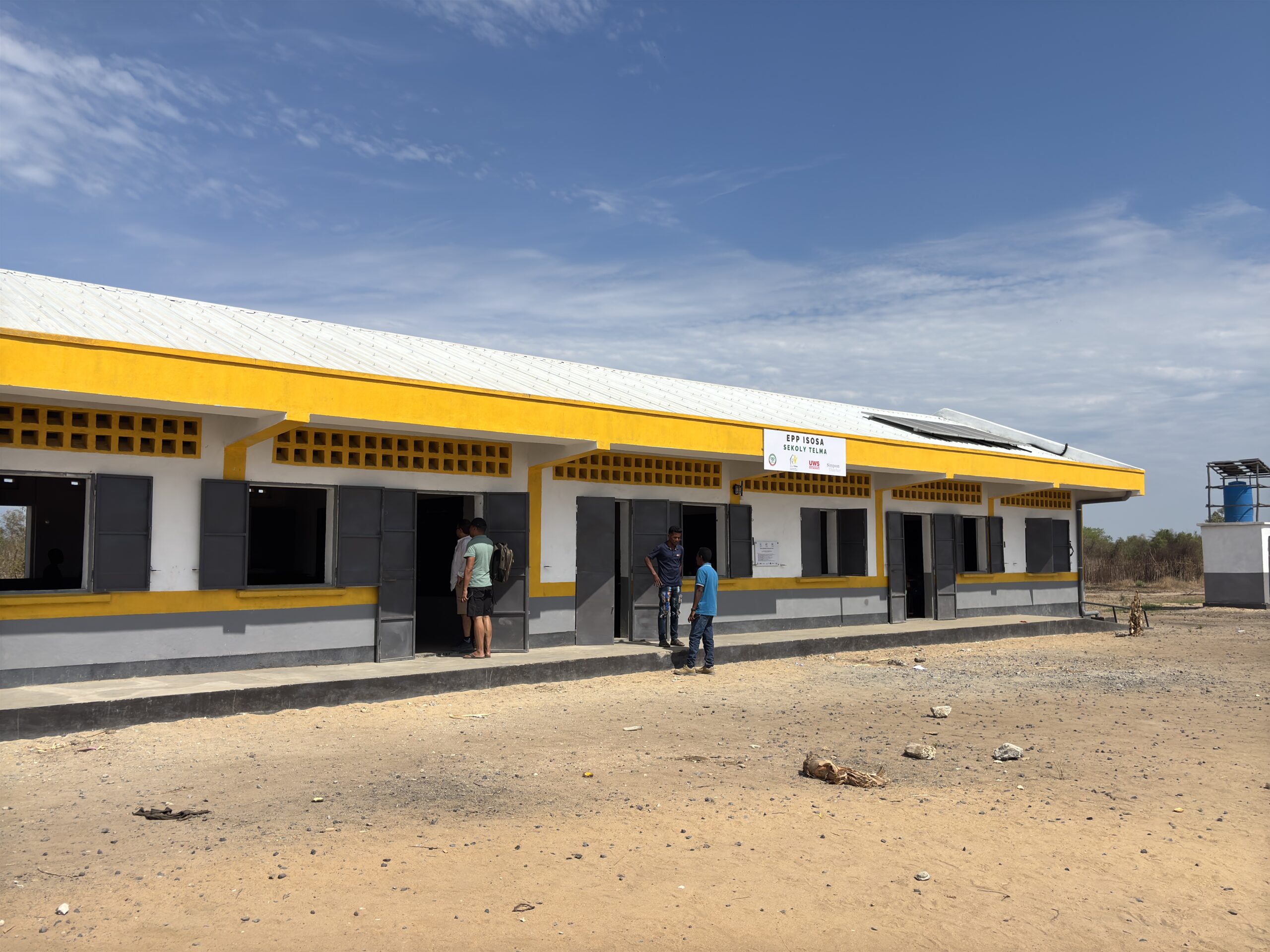

Empowering Girls Through Education
On International Women’s Day, we proudly championed our Girls’ Education programme, with members of the UWS team sharing what inclusion means to them.
Our Girls’ Education programme is three-year programme in collaboration with the UK Government (as part of the UK Aid Match Initiative) to improve access to gender-transformative education across 211 communities in Nepal and Cambodia. Together we’re empowering young girls to break down barriers, access quality education and fulfil their dreams.
Walk for Education
Our Walk for Education campaign on World Environment Day in June, emphasised the synergy between education and environmental sustainability. UWS teams around the world raised a Green Thumb in solidarity with children fighting for their right to education and a healthy planet.
Thank you to all the schools and businesses who joined us in this virtual fundraiser - and to all the UWS schools and students around the world who participated in a variety of eco-friendly activities. Every step taken, and every pound raised, brought us closer to a brighter future for both children and our planet


Supporting Children to Stay in School
Education is a fundamental right, yet many children still face significant barriers to completing their schooling. This year saw the successful completion of our three-year Dropout Prevention Programme (2021-2024), in partnership with Education Above All’s Educate A Child (EAC) Program.
We’re proud to share we exceeded our target, identifying and supporting over 6,000 children at risk of dropping out of school, 95% of whom remained in education.
Exam Success in Madagascar
Huge congratulations to our dedicated team and students in Madagascar! Their phenomenal efforts resulted in a staggering 99.5% pass rate for exam sitters in July. The Certificate of Primary Education is a significant milestone for Malagasy children, marking their first official examination and an important tradition upon completing primary school.
Click here to hear from UWS Education Officers, Osny and Sahaza, on this success
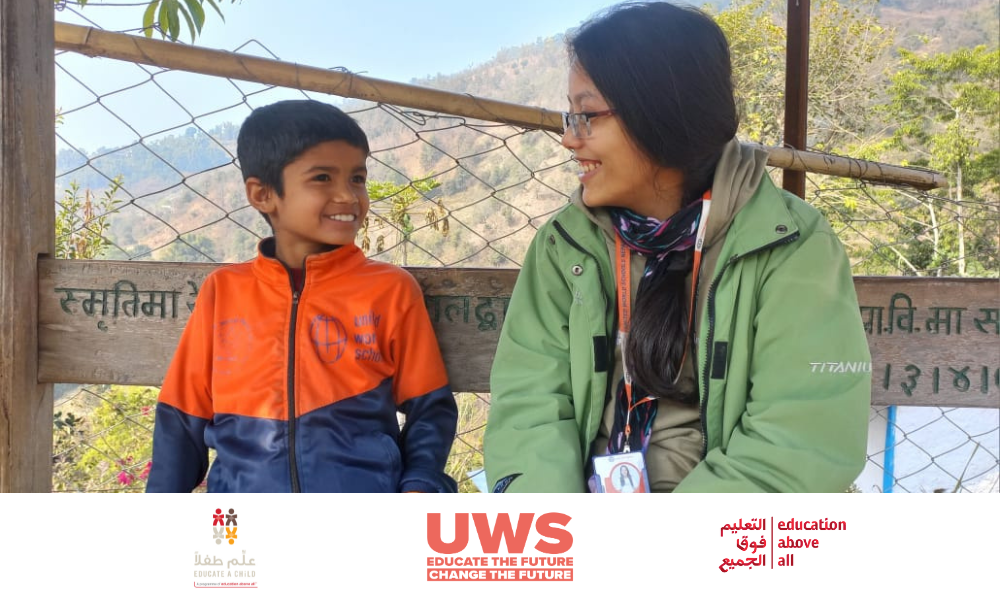
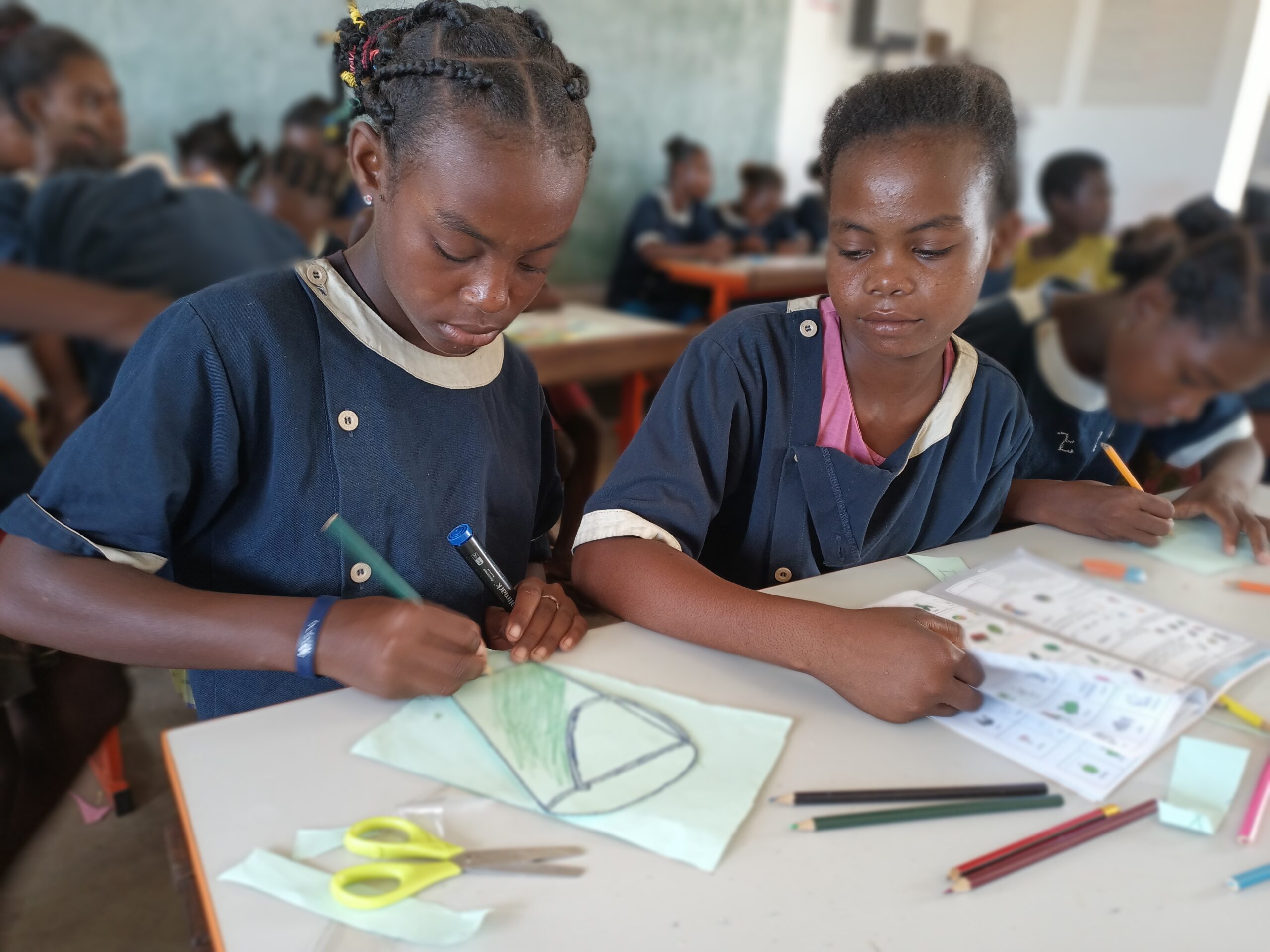
Uniting for a Brighter Future
In September, we had the privilege of attending the UN Summit of the Future in New York. This historic event brought together global experts and leaders to address the urgent challenges facing our planet.
Additionally, UWS Cambodia was proud to participate in the 5th National Conference of NGO Education Partnership (NEP), discussing transformative strategies aimed at enhancing education and learning outcomes for children in Cambodia.
The UWS Gala 2024: A Night to Remember
Our annual UWS Gala was a resounding success, raising over half a million pounds to support our mission. The UWS Gala brought together a vibrant community of supporters, all passionate about education and creating a brighter future. The funds raised will directly impact the lives of countless children, including supporting the construction of a new school in remote and rural Madagascar.
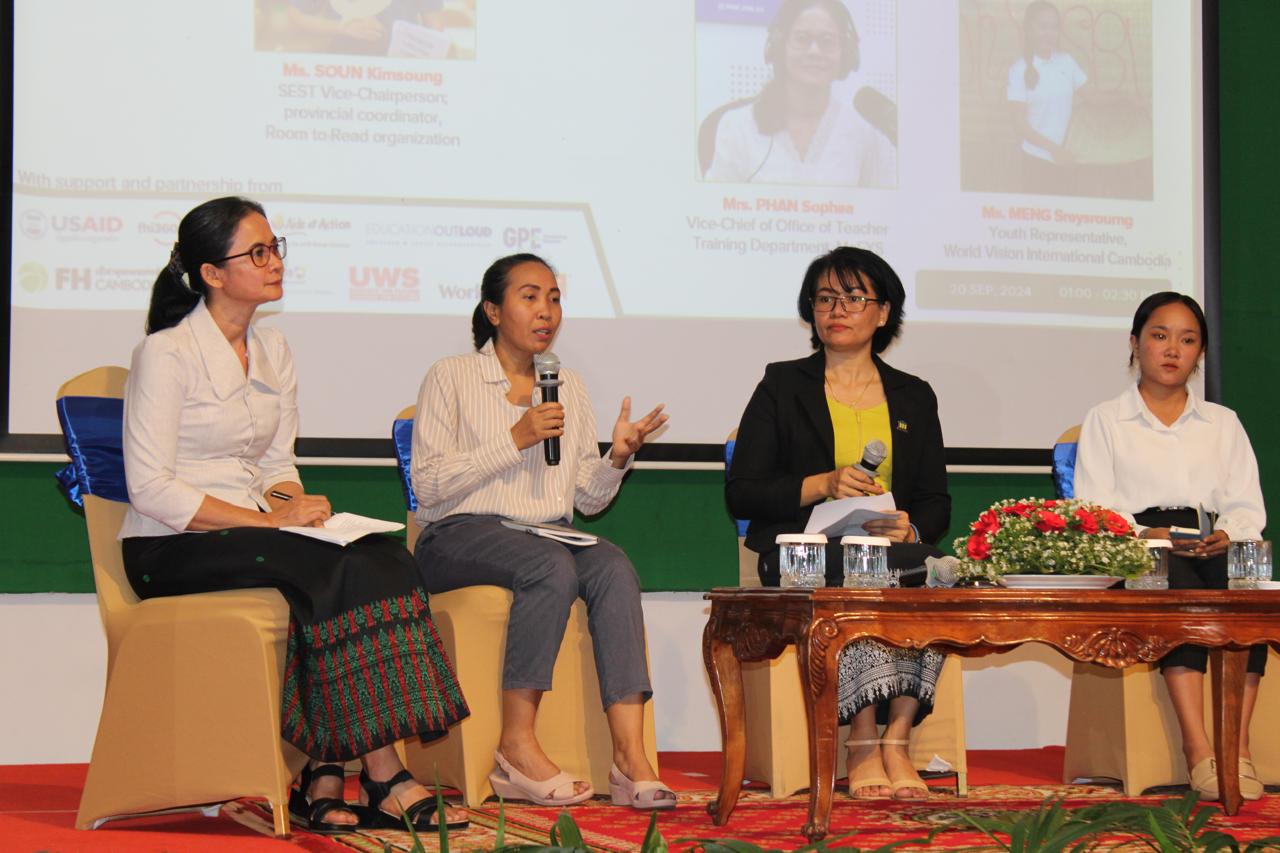
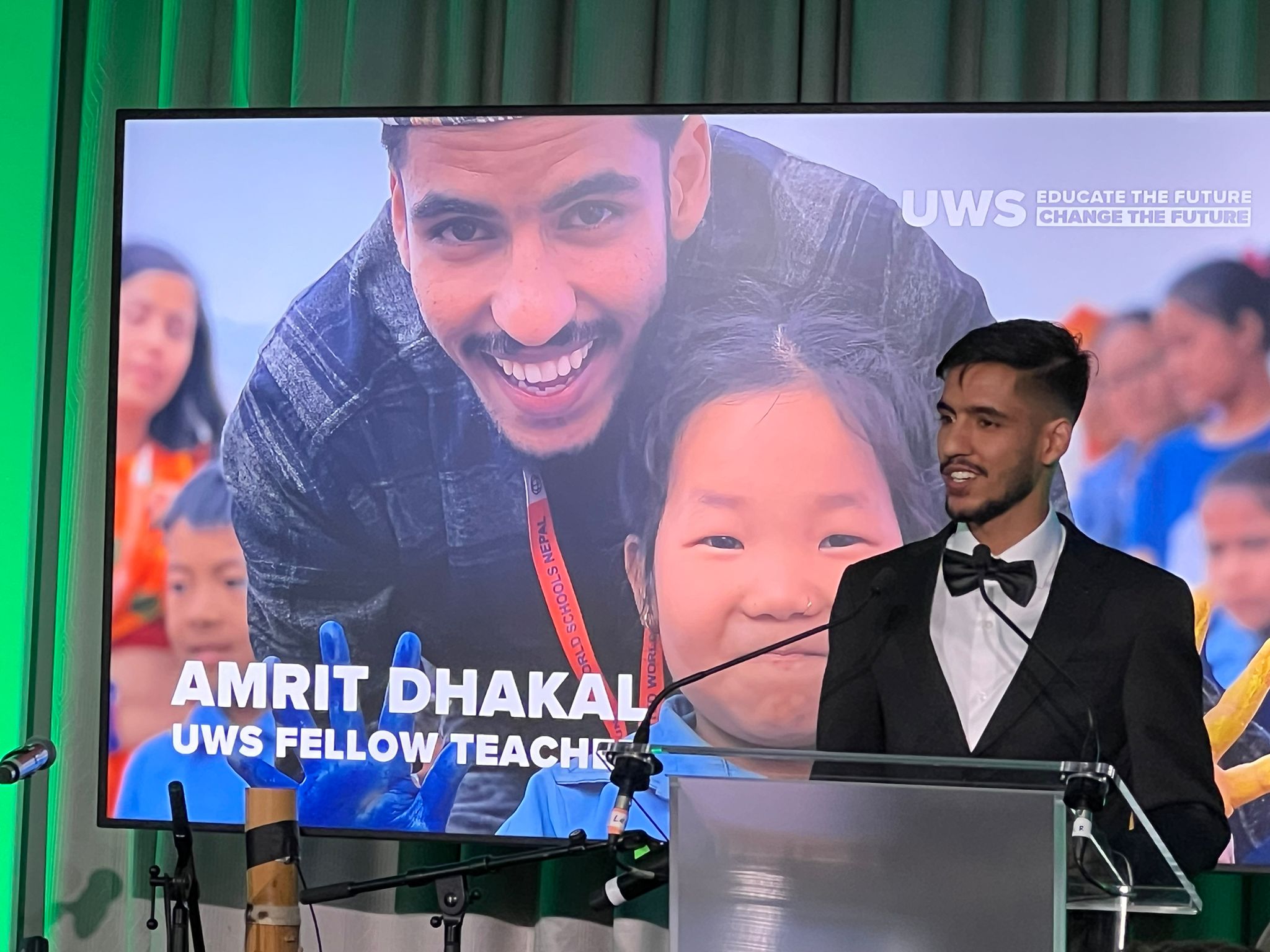
Celebrating School Fundraising
A huge thank you to all the schools who fundraised for UWS this year! Your creativity, dedication, and hard work have made a significant impact on the lives of countless children. From Tiffins Girls’ School’s thrilling benchball match to Cottonwood Classical Academy’s talented performances and Berlin Metropolitan School’s creative zombie theater production, your efforts inspire us.
Partnering for Impact
At UWS, we are so grateful and proud to partner with brands that lead with purpose, investing in the future of education for children in the world's most remote and marginalised communities. For the second year running, our incredible partner, Tropic Skincare, redefined Black Friday with their #GiveBackFriday campaign. Additionally, we’ve forged new partnerships with The Adaptavist Group, Arrow Capital, and Impact Food Group, joining forces to create a more equitable future.
UWS Germany: A New Chapter
We’re excited to announce the launch of UWS Germany, expanding our global reach and fostering a global movement for education. Founded in 2013 as a volunteer initiative called ConCultures, UWS Germany has evolved into a dynamic and impactful organisation, organising fundraising activities in German schools and forging important partnerships.
We are thrilled that UWS Germany has officially joined the UWS network in 2024. This new chapter will allow us to reach even more children with quality, inclusive education.
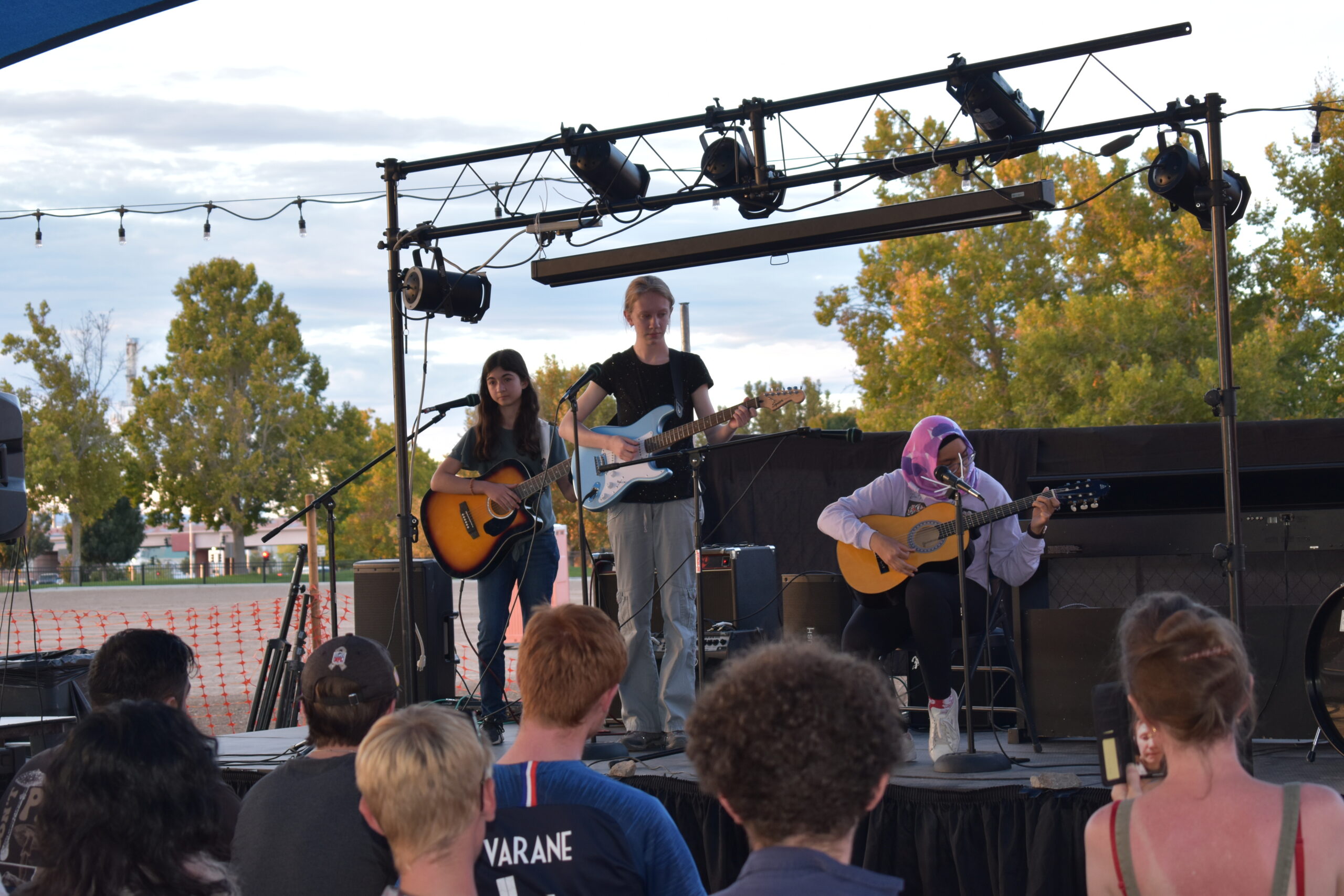
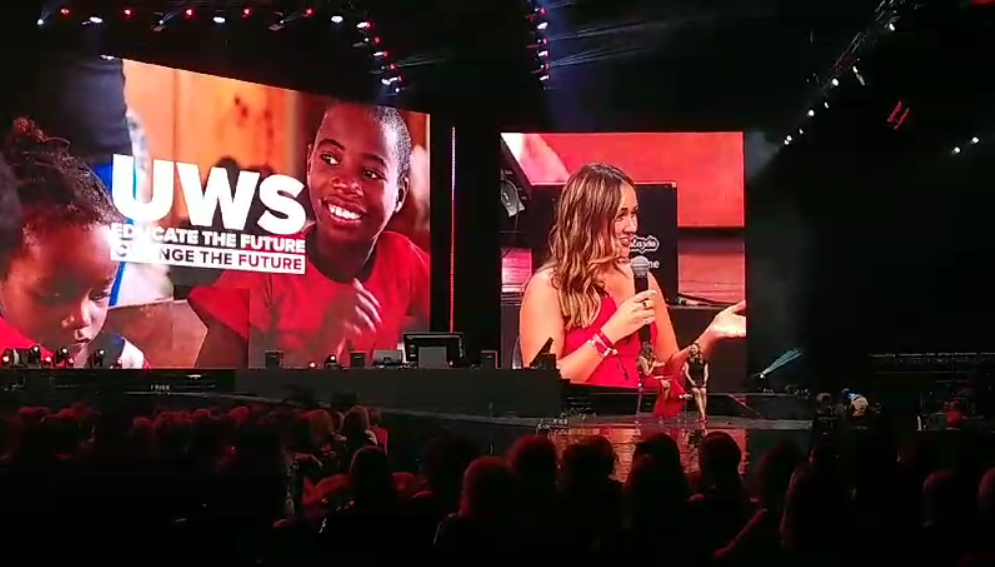
Looking Ahead to 2025
As we reflect on 2024's accomplishments, we're filled with immense gratitude for your incredible support. We wouldn't be here without your generosity and unwavering belief in our mission.
With your continued support, 2025 promises to be even more spectacular. We have exciting plans in the pipeline, and we can't wait to continue this transformative journey together.
The climate crisis is one of the defining human and child's rights challenges of our generation.
Environmental disasters are occurring almost 5 times as frequently as they were 40 years ago - disrupting the education of over 40 million children a year (FCDO, 2022). Even when children stay in school, climate change induced impacts, such as rising temperatures are affecting their ability to learn.
At UWS, we’ve seen the devastating consequences of climate and environmental change at first hand. From Cambodia to Myanmar, Nepal to Madagascar, the communities we work with are some of the most vulnerable to the impacts of climate change.
This October, heavy rains led to severe flooding and landslides across Nepal, directly affecting over 80,000 people, with many other indirectly impacted due to damages to water, sanitation, health and education facilities (UNICEF, 2024).
An Interconnected Crisis
- Disrupted Learning: Extreme weather events, such as floods, droughts, and cyclones, can damage or destroy schools, forcing closures and interrupting children's education.
- Reduced Attendance: Climate-related factors, like water scarcity and food insecurity, can cause children to miss school to help with household chores or seek alternative livelihoods.
- Health Risks: Climate change-induced diseases, such as malaria and dengue fever, can lead to increased absenteeism.
- Migration: Climate-induced displacement can force families to migrate, disrupting children's education and exposing them to new challenges.
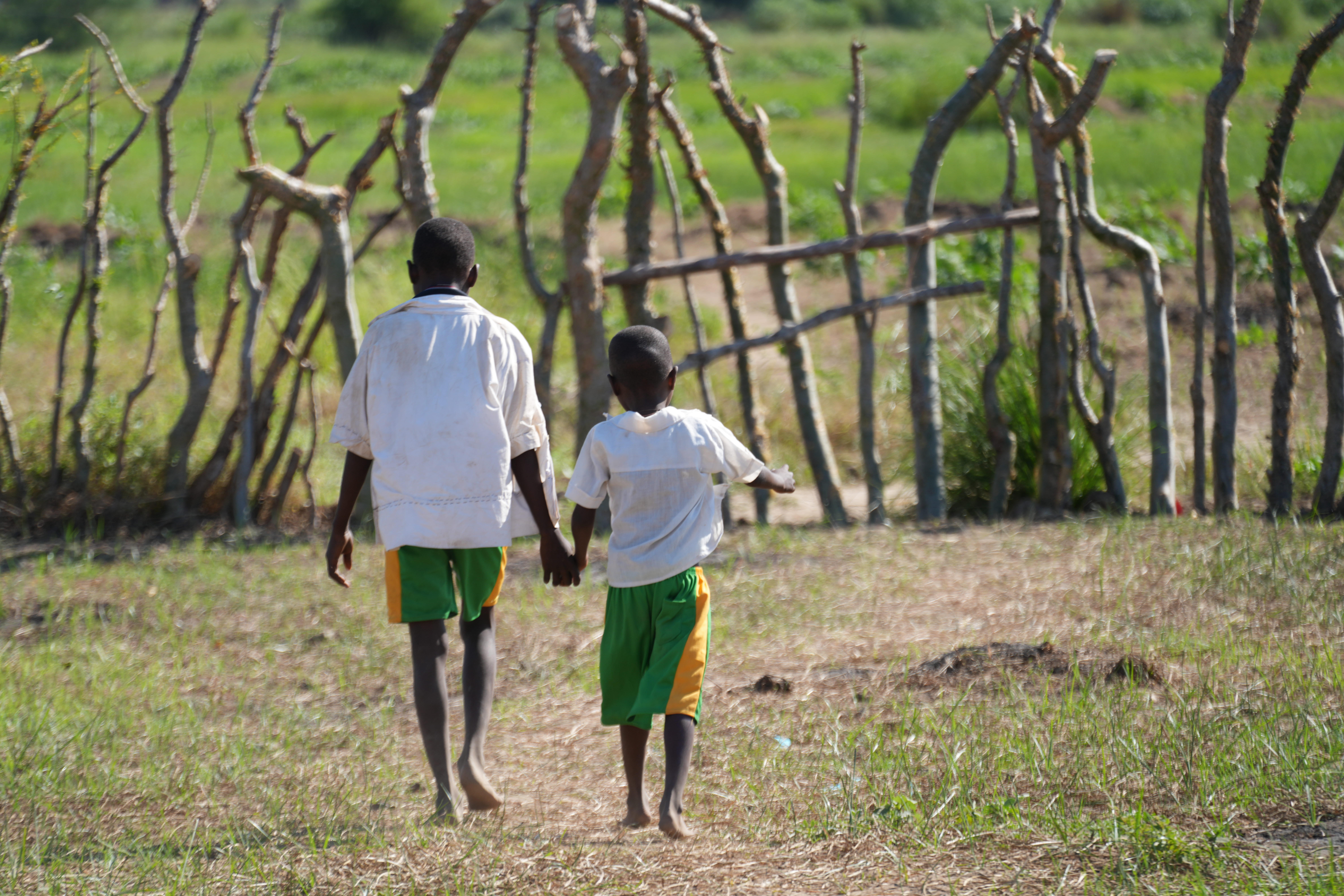

Did you know?
Countries' resilience to climate disasters significantly improves with every additional year of education that girls acquire, increasing by 1.6-3.2 points on the ND-GAIN index, which assesses a country's vulnerability and ability to adapt to climate change.
As world leaders and civil society gather in Baku, Azerbaijan at COP 29, we share this reminder:
- Without adapting education systems to climate and environmental change, education goals will continue to slip out of reach.
- Without incorporating the power of education into climate response, the chances of communities being about to adapt to increasingly hostile environments becomes increasingly slim
Yet education is a hugely undervalued component of global responses to climate change, largely absent from major climate financing mechanisms. At most 0.03% of all climate finance is spent on education (Clark et al, 2019).
A failure to address this poses a risk to meeting both education and climate global goals
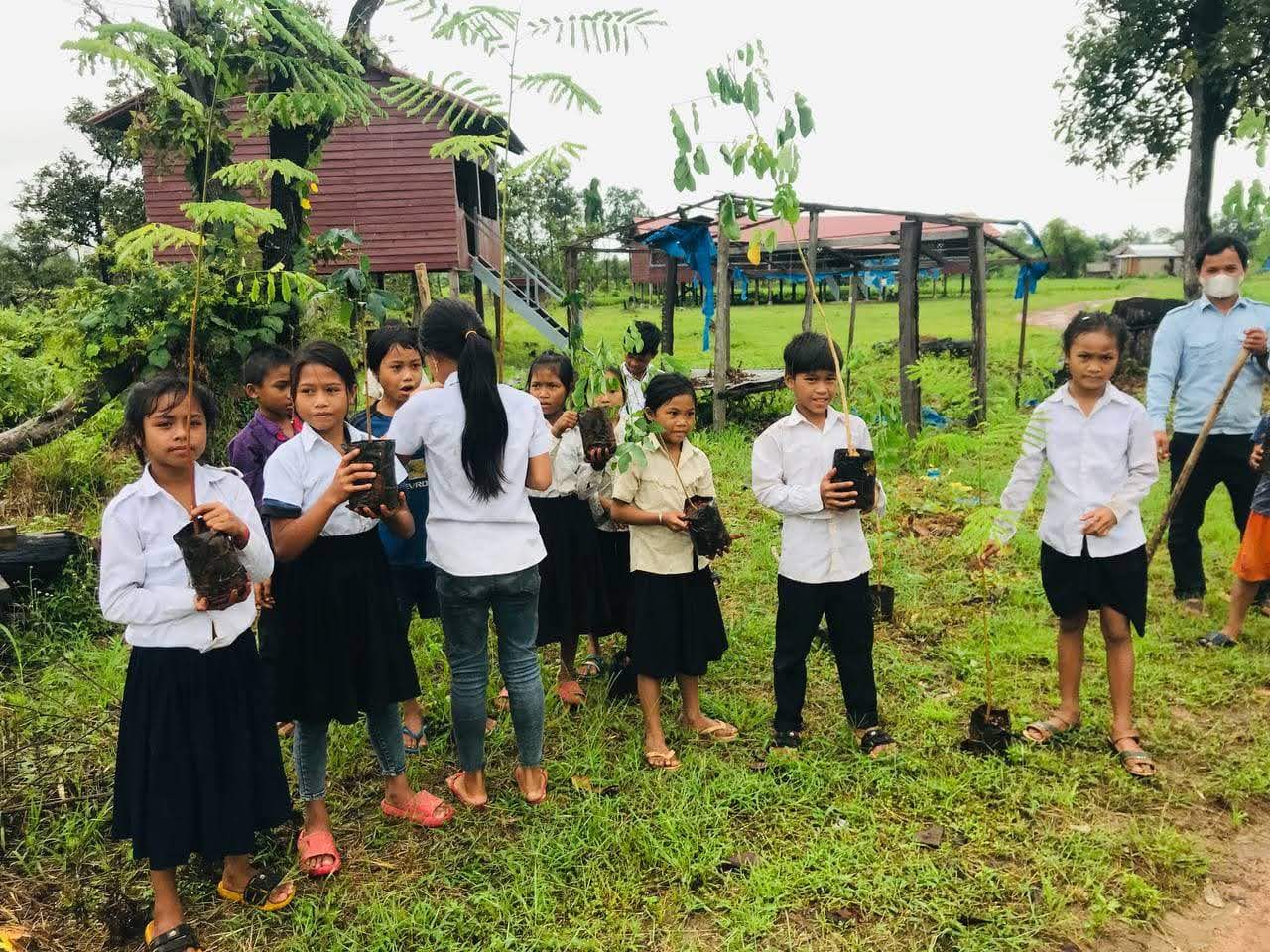

Our Commitment
At UWS, we are committed to addressing the complex interplay between climate change and education. We are working to:
- Build Resilient Schools: Constructing schools that can withstand extreme weather events and environmental hazards, providing safe learning environments for children. In Nepal, we have constructed 76 earthquake-resistant schools, ensuring they can endure seismic activity while providing secure learning spaces for children. In Madagascar, 22 schools have been constructed with cyclone-resistant designs, safeguarding children and their communities during severe storms.
- Deliver Quality Education: Children with foundational skills help families to better process and act on information about risk. Educated populations are healthier, more financially secure and better able to recover from climate shock. To empower the next generation, we integrate climate change education and disaster risk reduction (DRR) training into school curricula. In Nepal, students practice earthquake preparedness through drills and campaigns, while in Cambodia, children learn flood safety and water management. By equipping young people with these skills, we prepare them to adapt and build climate-resilient futures.
- Support Community-Based Adaptation: We also collaborate with communities to develop strategies that protect education and livelihoods, engaging them in tree planting and environmental awareness campaigns to thrive amidst climate challenges.
By addressing the climate crisis and investing in education, we can create a more sustainable and equitable future for the next generation. By shifting focus from delivering change in the short term, to empowering change for the long term, we go beyond educating the future, to changing it.
Education is a critical foundation for individual and societal development, yet many children in countries like Nepal and Cambodia still face significant barriers to completing their schooling.
The UWS and Education Above All’s Educate A Child (EAC) Drop-out Prevention Program (2021-2024) has been instrumental in addressing these challenges, working to keep marginalised children in school and supporting their educational journeys.
To assess the performance of the program, Rapid Asia gathered feedback through in-depth interviews with students, key informant interviews with representatives of the local governments, UWS, EAC and head of teachers as well as focus group discussions with participants and community members.
Addressing Barriers to Education
Poverty, gender, discrimination and rural settings are the most common factors that prevent many children from accessing and completing quality primary education. Despite the strong commitment from national governments to enhance school retention rates, these structural challenges continue to impede progress. The UWS-EAC Drop-out Prevention Program aimed to prevent dropouts among high-risk students in Cambodia and Nepal by designing interventions aiming to support and retain students within the educational system.
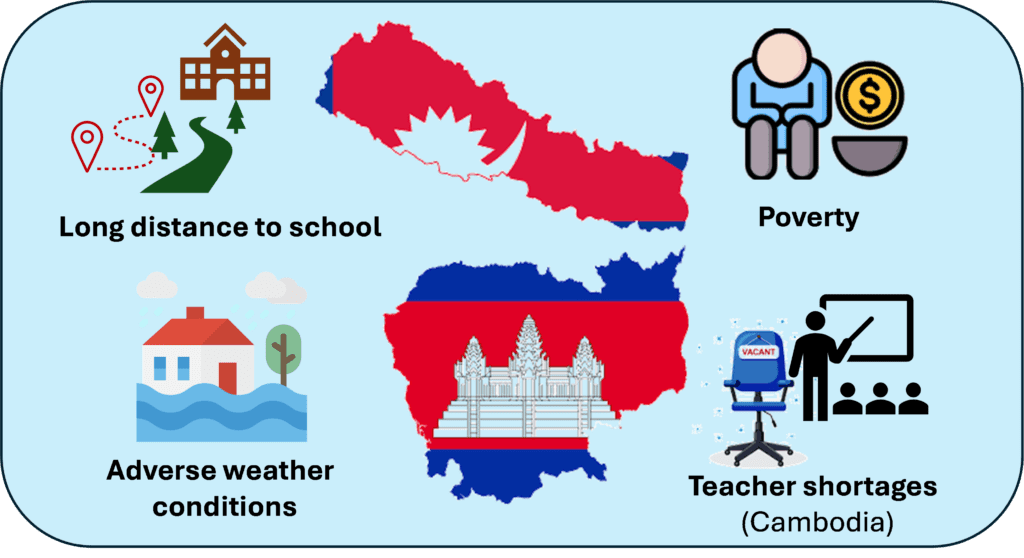
Figure I: Barriers to Education
Effective Intervention and Community Engagement
The program's evaluation highlights several key initiatives that have proven successful in reducing dropout rates and improving educational outcomes. Providing essential resources like school supplies and uniforms, along with establishing Girls' Clubs, Mothers' Group and home visits has had a profound impact. These initiatives not only met the immediate needs of students but also engaged the community in supporting education.
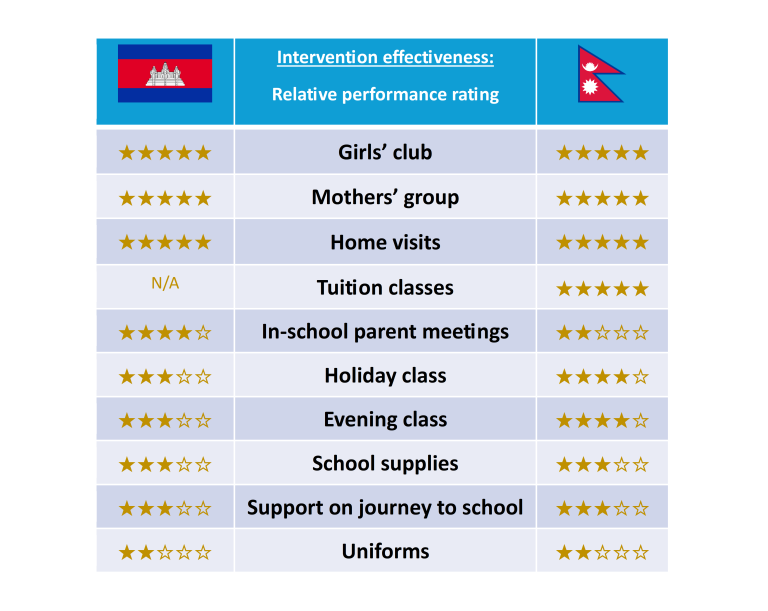
Figure II: Intervention Effectiveness of the EAC-UWS Dropout Prevention Program in Two Countries
A key strength of the program is its strong alignment with the priorities of the local government. By fostering strong relationships with government partners, the program ensured that its interventions were relevant and effectively implemented. This collaboration has been crucial in amplifying the program’s impact and sustaining its outcomes.
Efficient Use of Resources and Innovative Approaches
Efficiency has been a cornerstone of the program’s success. The innovative co-payment model for community teacher salaries in Nepal is a prime example of how resource constraints can be overcome through creative solutions. This model not only ensured the availability of sufficient teaching staff but also fostered community involvement in education. Such approaches could be replicated in other regions to extend program reach.
However, there are areas where efficiency could be improved. In particular, providing additional support for students who travel long distances to school and ensuring adequate resources for uniforms and school supplies are pressing needs that should be prioritised.
Impact on Impoverished Families and Female Students
The positive impact of the program was particularly notable among impoverished families and female students, who often face the greatest barriers to education. Targeted interventions like home visits, parent meetings, and community engagement and mobilisation have been successful in promoting school attendance and creating a supportive educational environment. Despite these successes, poverty remains a significant barrier, highlighting the need for ongoing support and targeted interventions.
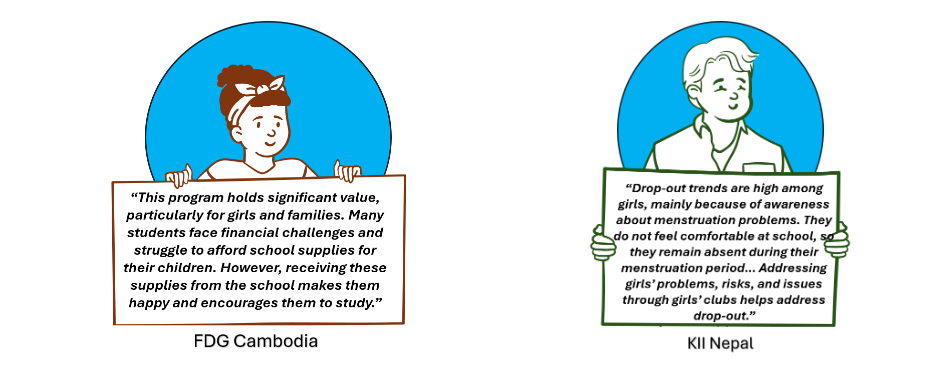
Recommendations for Sustained Impact
To sustain and enhance the program's impact, several recommendations have been put forward, including:
- Maintain Program Structure: Continue the ecological approach of engaging stakeholders at all levels to influence school retention effectively.
- Strengthen Government Partnerships: Maintain and leverage relationships with local governments to align with their priorities and enhance collaboration.
- Continue Effective Initiatives: Persist with successful initiatives, including Girls’ Clubs, Mothers Groups, home visits, and material support provision.
- Support Student Commutes: Provide additional support for students’ commutes to address safety concerns and challenges during adverse weather conditions.
- Increase Resources for Uniforms and Supplies: Ensure that all students have the necessary materials to participate fully in their education.
- Encourage Local Government Replication: Support local governments in replicating or continuing successful program initiatives for sustained impact.
- Improve Flexibility in Budgeting: Enhance budget and project amendment processes to accommodate on-the-ground realities.
The UWS-EAC Drop-out Prevention Program has made significant progress in promoting school retention and preventing dropouts in Nepal and Cambodia. By focusing on effective strategies, community engagement, and government collaboration, the program has set a strong foundation for continued success. Sustained efforts and strategic enhancements will be crucial in expanding the program’s reach and ensuring that more children can complete their education and unlock their full potential.
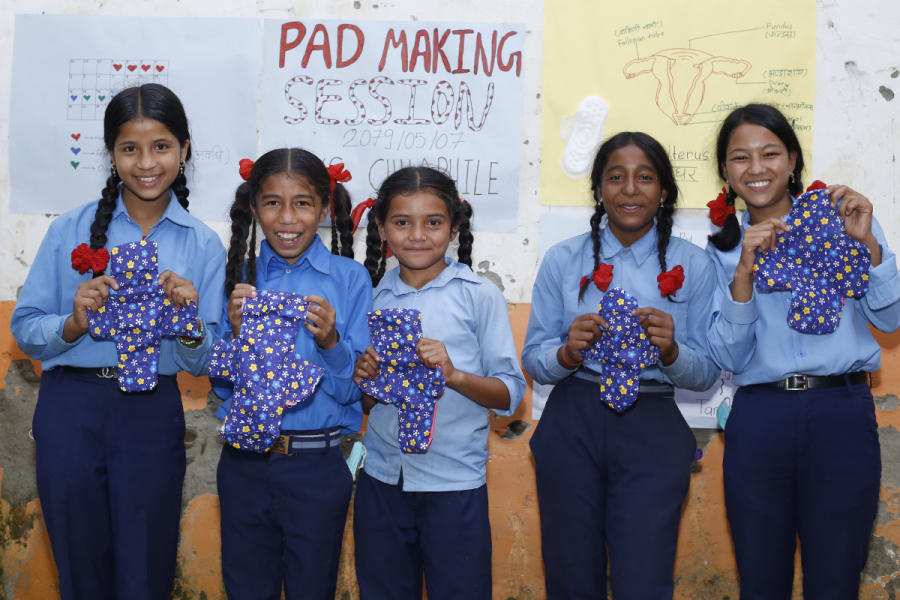
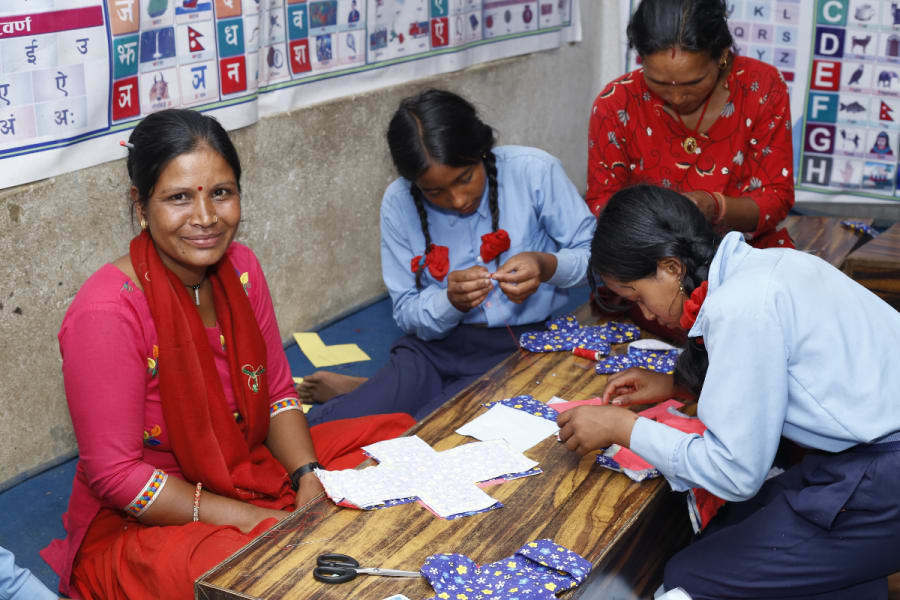
About the authors: Daniel Lindgren is the Founder of Rapid Asia Co., Ltd., a management consultancy firm based in Bangkok specializing in evaluations for programs, projects, social marketing campaigns and other social development initiatives. Denise Erber holds a Master´s degree in Global Studies and is working with Rapid Asia as a consultant.
About UWS: UWS is an international non-profit that provides children in remote and marginalised regions access to quality, inclusive education.
About Education Above All Foundation: Education Above All Foundation empowers out-of-school children and marginalized youth by overcoming barriers to quality education. Learn more at: | Education Above All Foundation
About Educate A Child (EAC): Launched in 2012, Education Above All’s Educate A Child (EAC) programme helps millions of out-of-school children (OOSC) worldwide overcome barriers to primary education through partnerships and innovation. EAC plays a key role in improving access and retention for OOSC, driving positive change for children, their communities, and global sustainability. Learn more at Educate A Child | Education Above All Foundation
WHAT DOES INCLUSION MEAN TO YOU?
"Inclusion means creating spaces where everyone feels they truly belong. It is about celebrating our differences and creating a community where everyone's voice matters”
- Sreynak Hun, UWS Cambodia
Jeannette Rakotoniaina, UWS Madagascar: Inclusion is what allows an individual, or a group, to integrate, to participate and to feel valued with confidence so that they can achieve their full potential.
Natasha Kafle, UWS Nepal: Inclusion is about creating safe, secure and equitable places for everyone, particularly girls, women, people across different gender and sexuality spectrums, and individuals with disabilities, such that they get a fair chance to contribute and thrive.
Susie Ma, Tropic Skincare and UWS supporter: Inclusion, for me, means quite literally including everybody, regardless of their geographical location, their age, the colour of their skin, their background, their beliefs. Everyone is included in terms of what they deserve to have – from education to career progression and everything else that life has to offer.
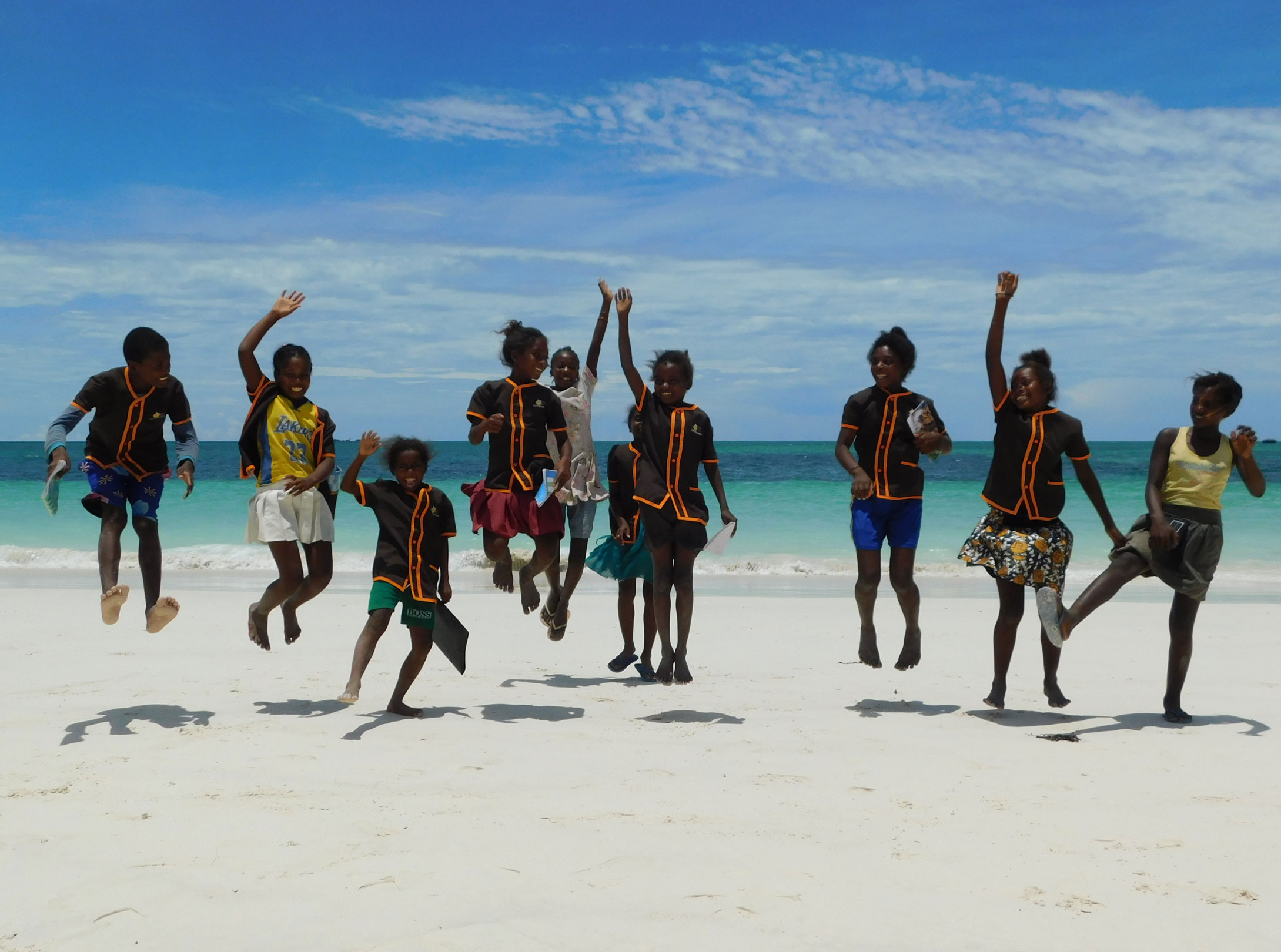
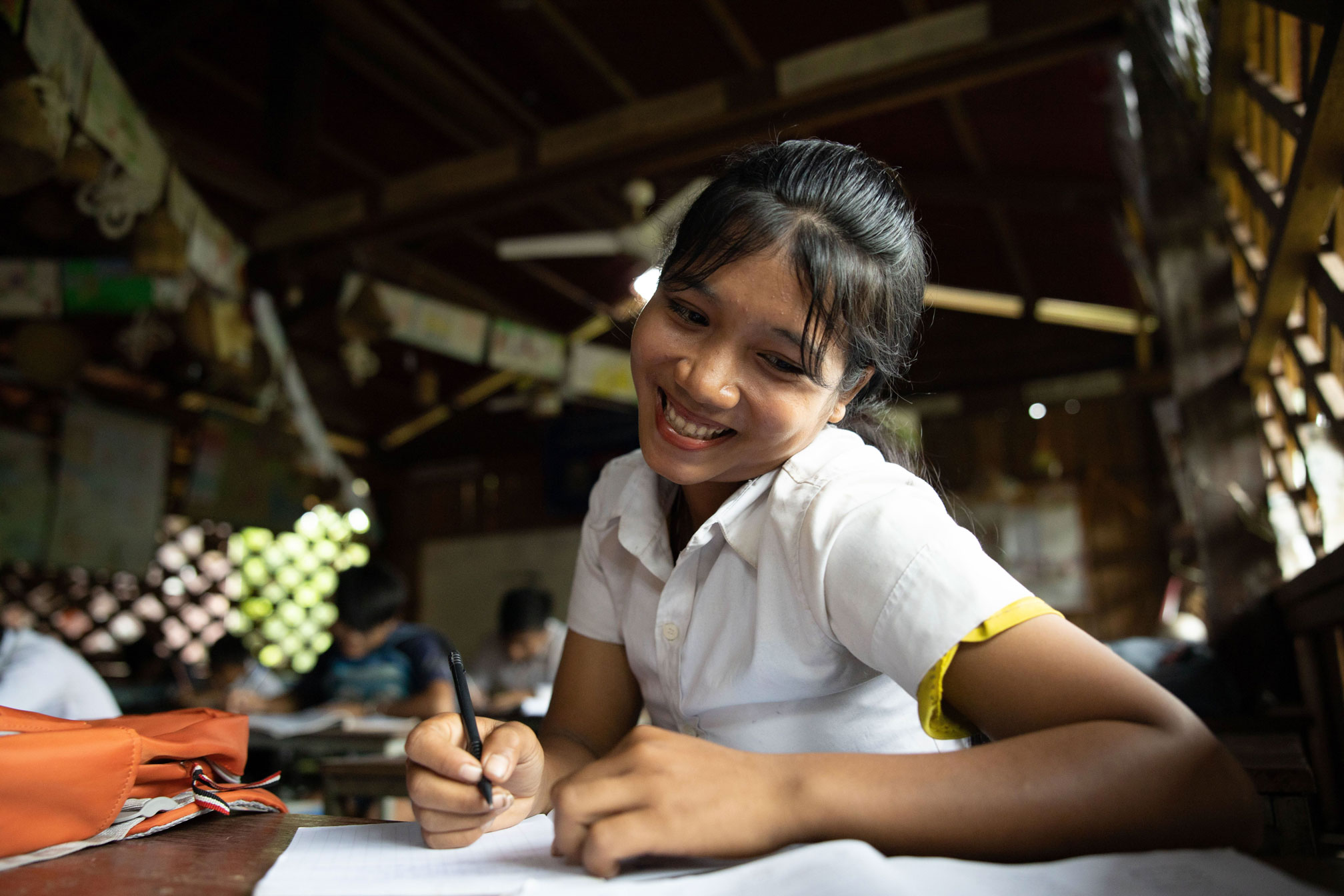
HOW ARE YOU INSPIRING INCLUSION WITH UWS?
"A teacher training programme that supports teachers in making each UWS school an inclusive space where every child, boy and girl, feels welcomed and valued.”
- Jeannette Rakotoniaina, UWS Madagascar
Sreynak Hun, UWS Cambodia: At UWS, I’m inspiring inclusion by amplifying voices of students and children with disabilities, and other children from diverse backgrounds in the remote communities in Cambodia. I discuss with key stakeholders how to make inclusion work and open dialogue, creating spaces where everyone feels heard, valued and understood.
Jeannette Rakotoniaina, UWS Madagascar: I inspire inclusion by supporting the education system in the development of teacher training programmes in Madagascar. A training programme that supports teachers in making each UWS school an inclusive space where every child, boy and girl (without distinction), feels welcomed and valued.
We work with parents and local leaders to help them participate so that every child can build a new future through education. So that they will have the chance to succeed together.
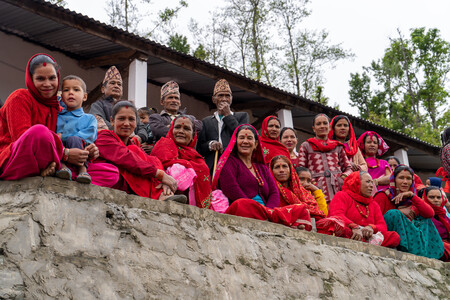
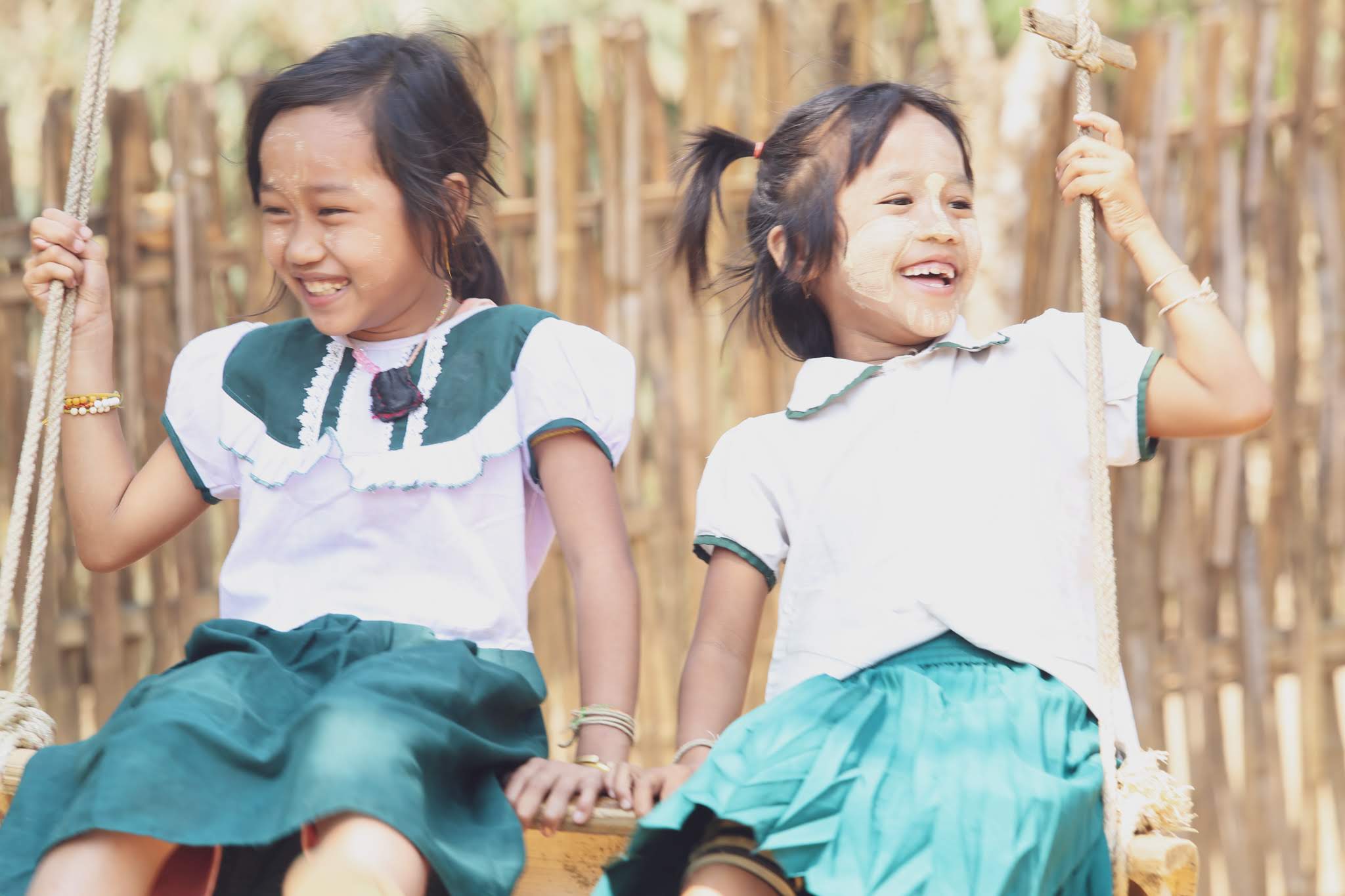
"Together with these women and girls, we are building brighter communities and schools for a better future”
- Natasha Kafle, UWS Nepal
Natasha Kafle, UWS Nepal: Inclusion at the core of all programmes at UWS Nepal. One powerful example of inclusion in action is the formation of support networks, like Mothers’ Groups and Girls’ Clubs in every UWS school.
Women and girls of these groups meet regularly. They discuss health, education, finances and safety. They empower each other and ensure their voices are heard and if any concerns arise, they even hold the school accountable for a fair and supportive learning environment. Together with these women and girls, we are building brighter communities and schools for a better future.
Susie Ma, Tropic Skincare and UWS supporter: We’re inspiring inclusion all over the world through our work with UWS. By teaching the unreached and reaching children in some of the most remote parts of the world and giving them access to education.
United World Schools is committed to challenging gender inequality in every facet of our work, and the passion and commitment of our female colleagues and community members is essential to achieving our mission. To find out more about how we champion gender equality in the communities we work in, and across our organisation, read our inclusion policy.
It might sound cheesy, but it's true. From Madagascar to Nepal, to Cambodia to Myanmar - and back again.
Access to quality education changes lives dramatically, but differently. No two stories are ever the same. And yet - love is the common thread in every story we tell.
This week, we're sharing stories of the generous professionals who put so much passion and care into each UWS school you fund.
“I love my job as a teacher, it’s gorgeous. It’s wonderful to be with my students in lessons. I spend time with them in the library, encouraging them to read books or create art. UWS Pu Korng School is the children’s hope in the village.”
Mr Tich - UWS Teacher in Cambodia
Mr Tich
– UWS Student, now UWS teacher in Cambodia
Despite facing limited educational opportunities as a child in his remote Cambodian village, Mr. Tich’s determination to learn always burned bright. Thanks to your support of UWS, we constructed UWS Pu Korng School in his village, and once he’d finished there, Mr. Tich cycled 15km each day to finish his secondary school studies too.
“I was a hard-working student. I tried hard in lessons and I did as much homework as I could. After I finished studying at UWS Pu Korng School, I went to Secondary School – it was far to go as student on my bicycle every day. But I didn’t give up”.
Now, fueled by that same passion, Mr. Tich has returned to his village, taking up his place as a community teacher at UWS Pu Korng School, and sharing his love of learning with the next generation.


“I am so happy to have joined the team 8 years ago. I get to travel, meet new people and learn many things. People around me are very proud of what we do. The communities we work with adore us and our work."
Shyam - UWS Construction Worker in Nepal
Shyam
– UWS Construction Worker, Nepal
18 years ago, Shyam, a construction worker in Nepal, was in a serious accident that led to his hospitalisation and a critical operation. It was a life-changing moment for Shyam and his family.
Despite this hardship, Shyam persevered. He now works as a building officer with UWS Nepal – sharing that:
“Building schools isn’t merely a job, but it’s about crafting opportunities for a better future”.
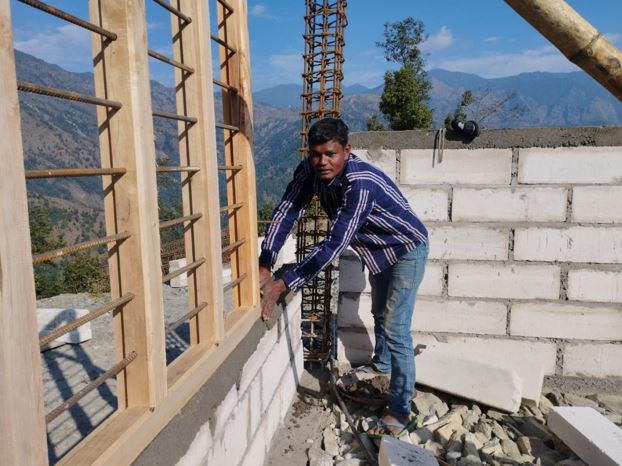
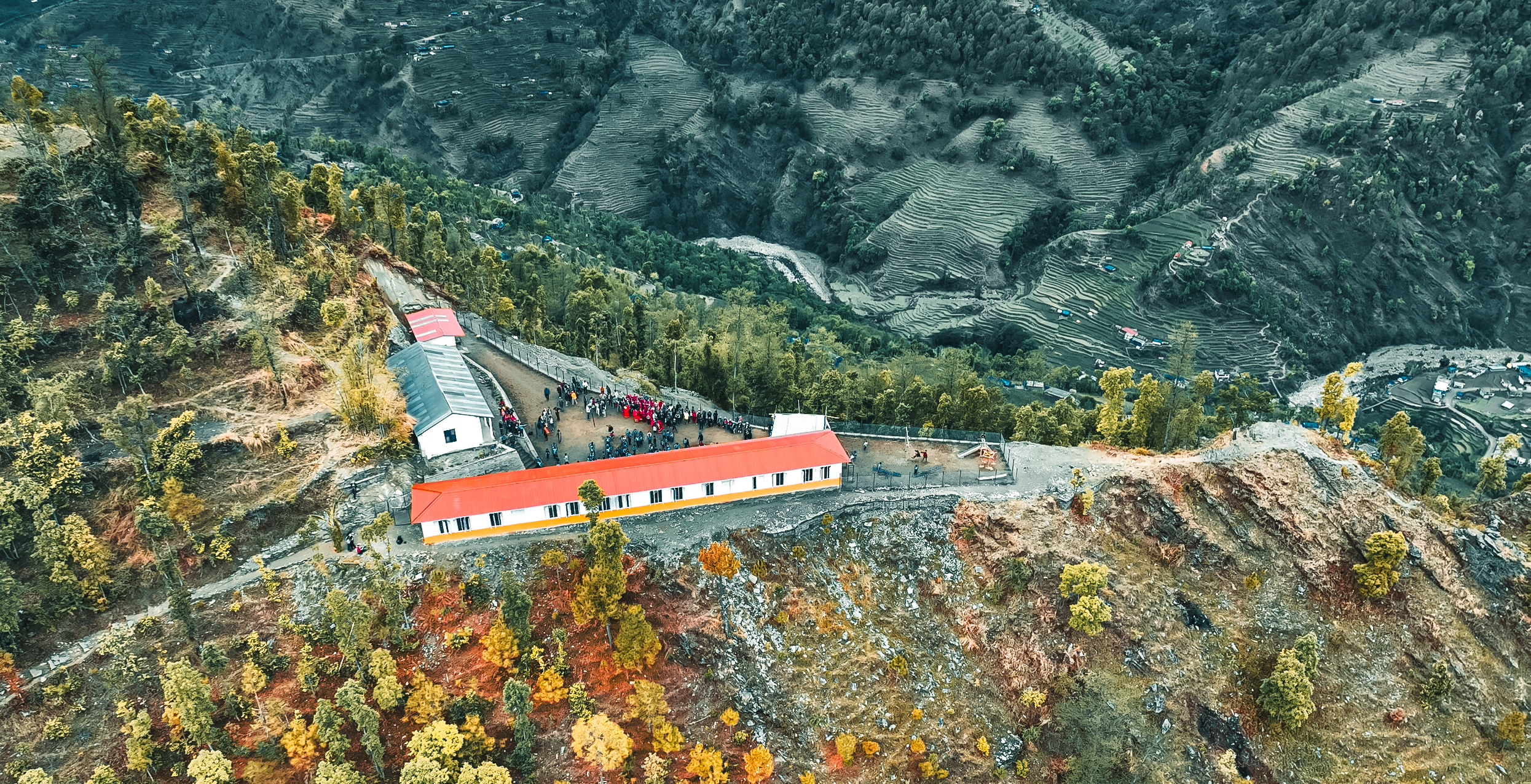
“Before, we were teaching in poor conditions, under trees or in a wooden hut that couldn’t shelter the children in the heat or when the rain came. But today, this is no more, with UWS we have a school building and frequent training courses for all teachers".
Goda - UWS Teacher in Madagascar
Goda
– UWS Teacher, Madagascar
For many years, when he could, Gola taught lessons to the children in his village under a tree (pictured below).
But, without a salary, this wasn’t something he could do everyday, having to fish or farm to support his livelihood.
UWS opened UWS Beangolo School in September 2022, providing Gola and his colleagues with secure employment, as well as the training opportunities to pursue their careers.
“I have been able to master my work as a teacher, improving the quality of my teaching”.
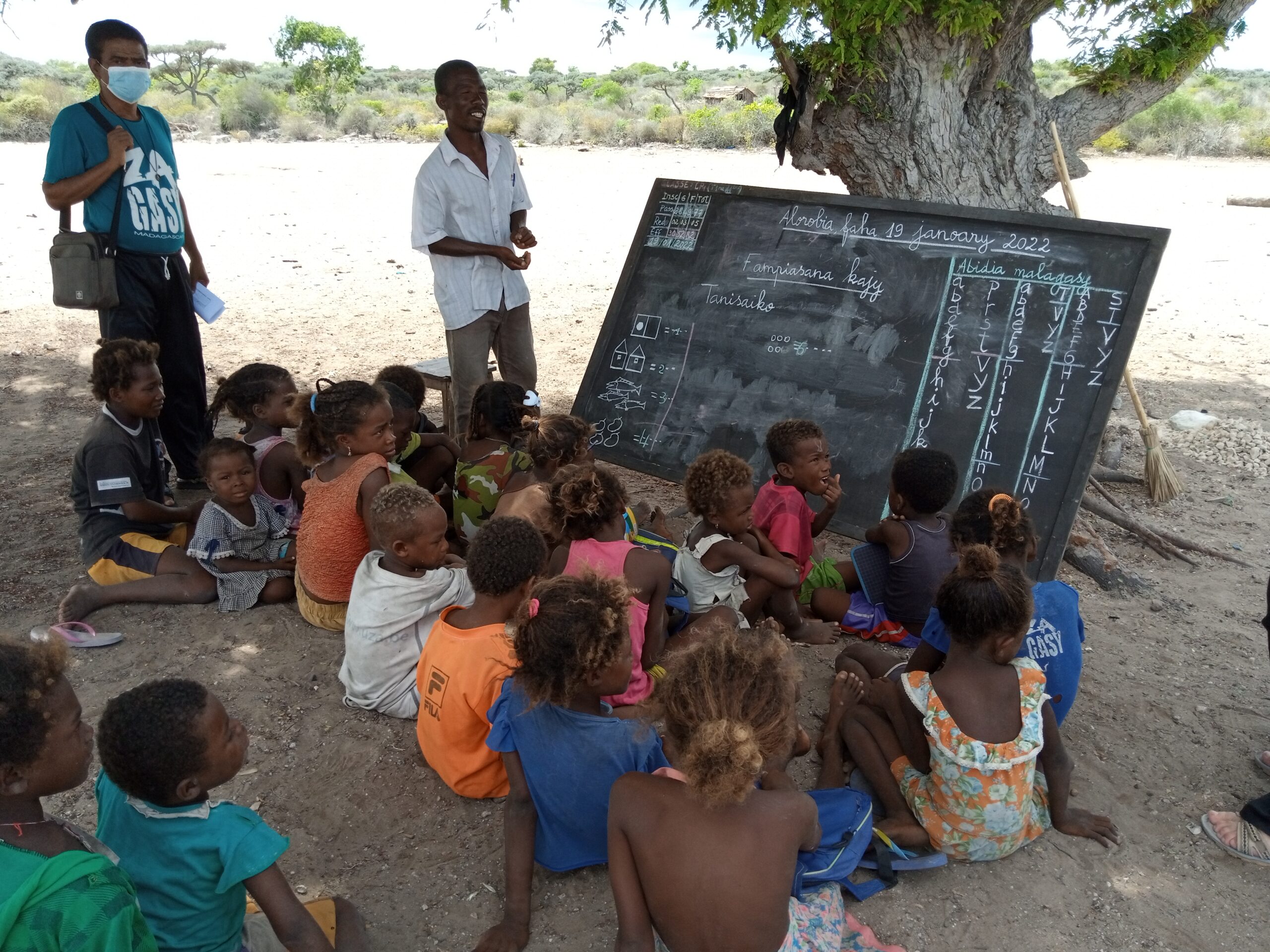
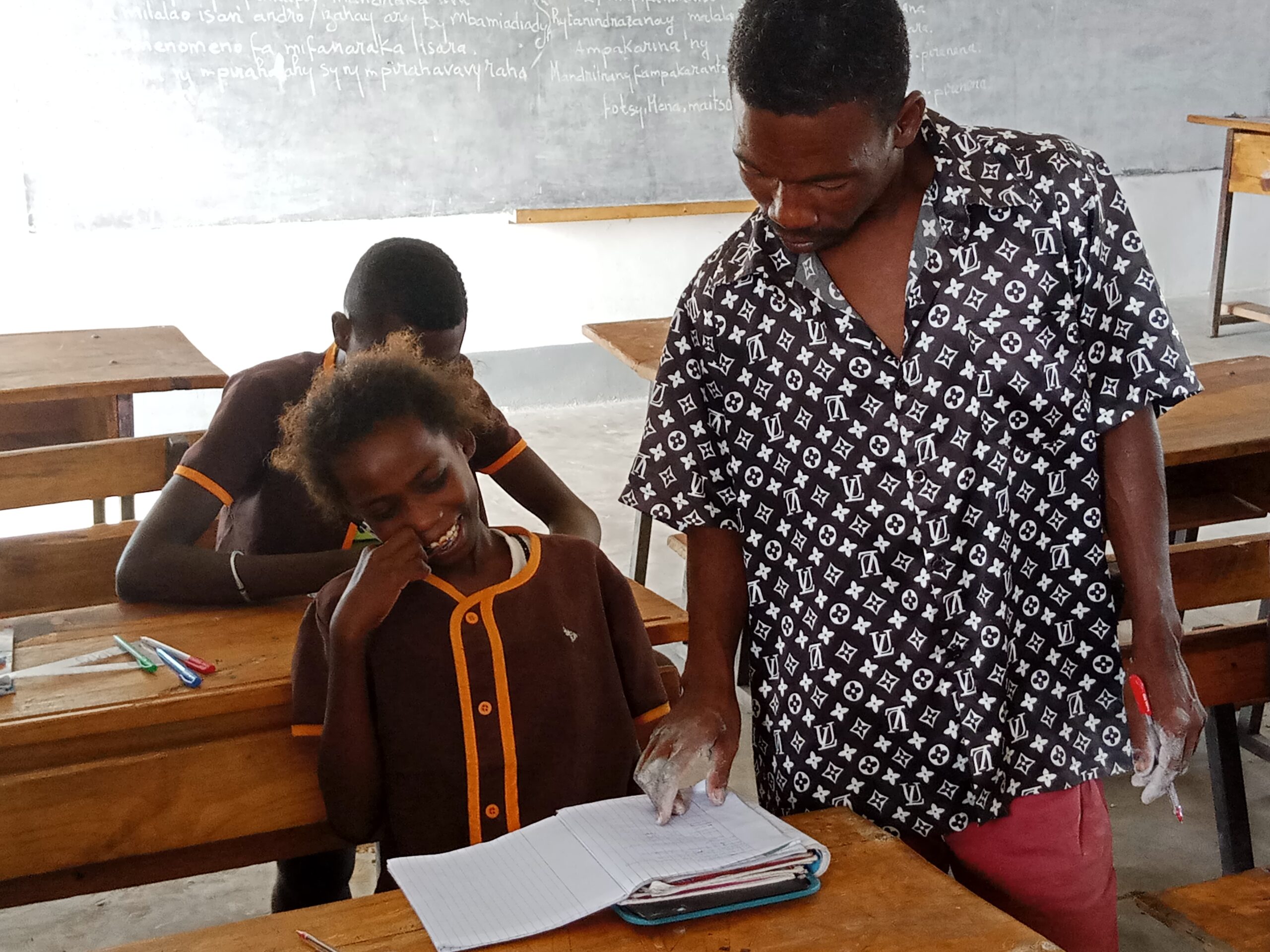
“Of course there are times when teaching is challenging, or when my lesson plans don't always work out as I'd hoped. But when I see the students doing well, I feel motivated to give more than what I have".
Nar Mee Shel - UWS Teacher in Myanmar
Nar Mee Shel
– UWS Teacher, Myanmar
Nar Mee Shel is responsible for the Grade 3 and 4 class at her UWS primary school in Myanmar. Teaching Maths, Burmese and Science, Nar Mee Shel teaches children whose first language is not the national language, Burmese.
A passionate educator, Nar Mee Shel loves her job – through the challenges and rewards of teaching she perseveres. She’s determined to do her very best for each of the students in her care.
“It’s obvious that the students are improving, especially in their language proficiency because when the UWS team visit the school, the students chat to them in Burmese, not their mother tongue”.
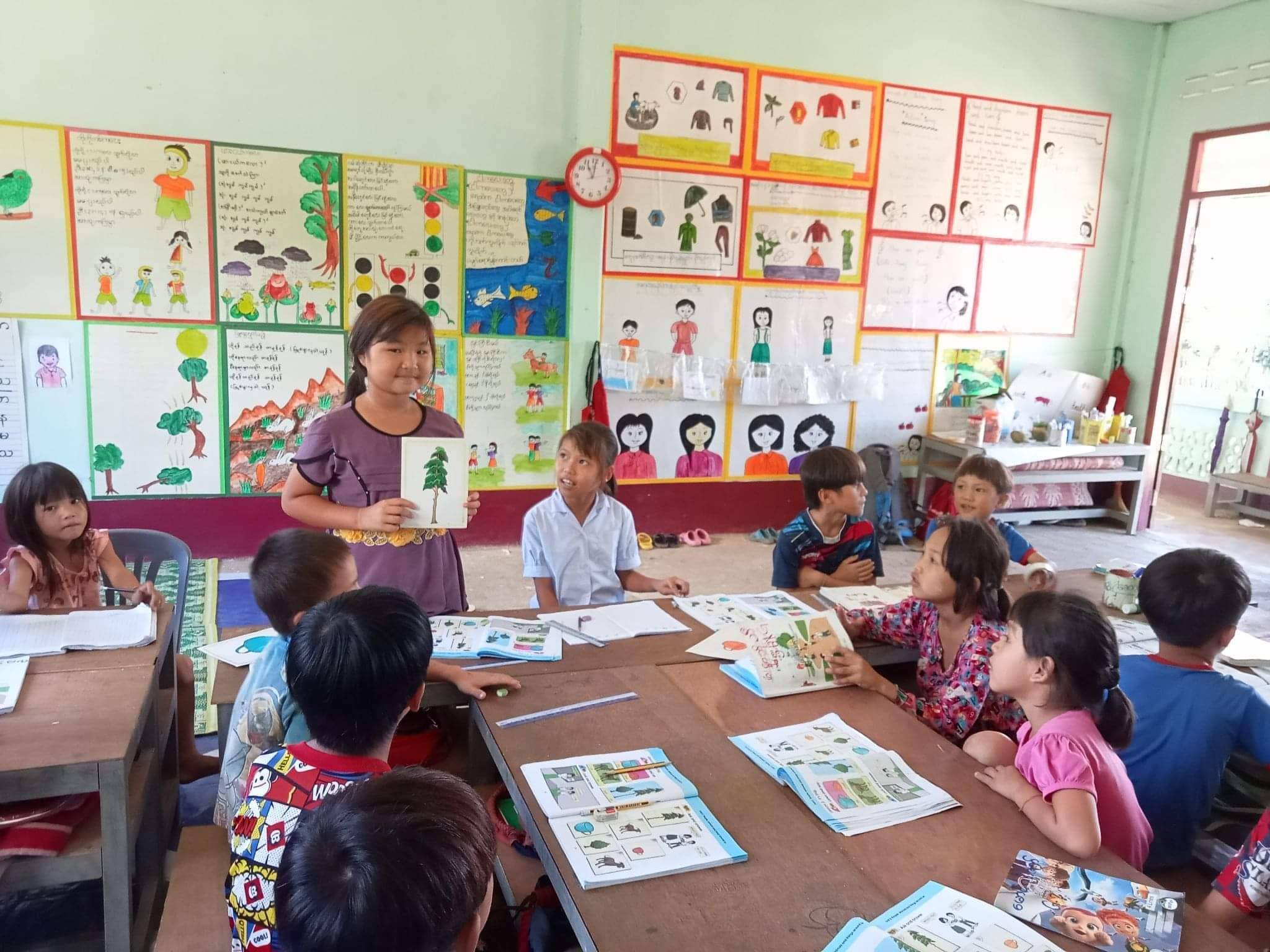
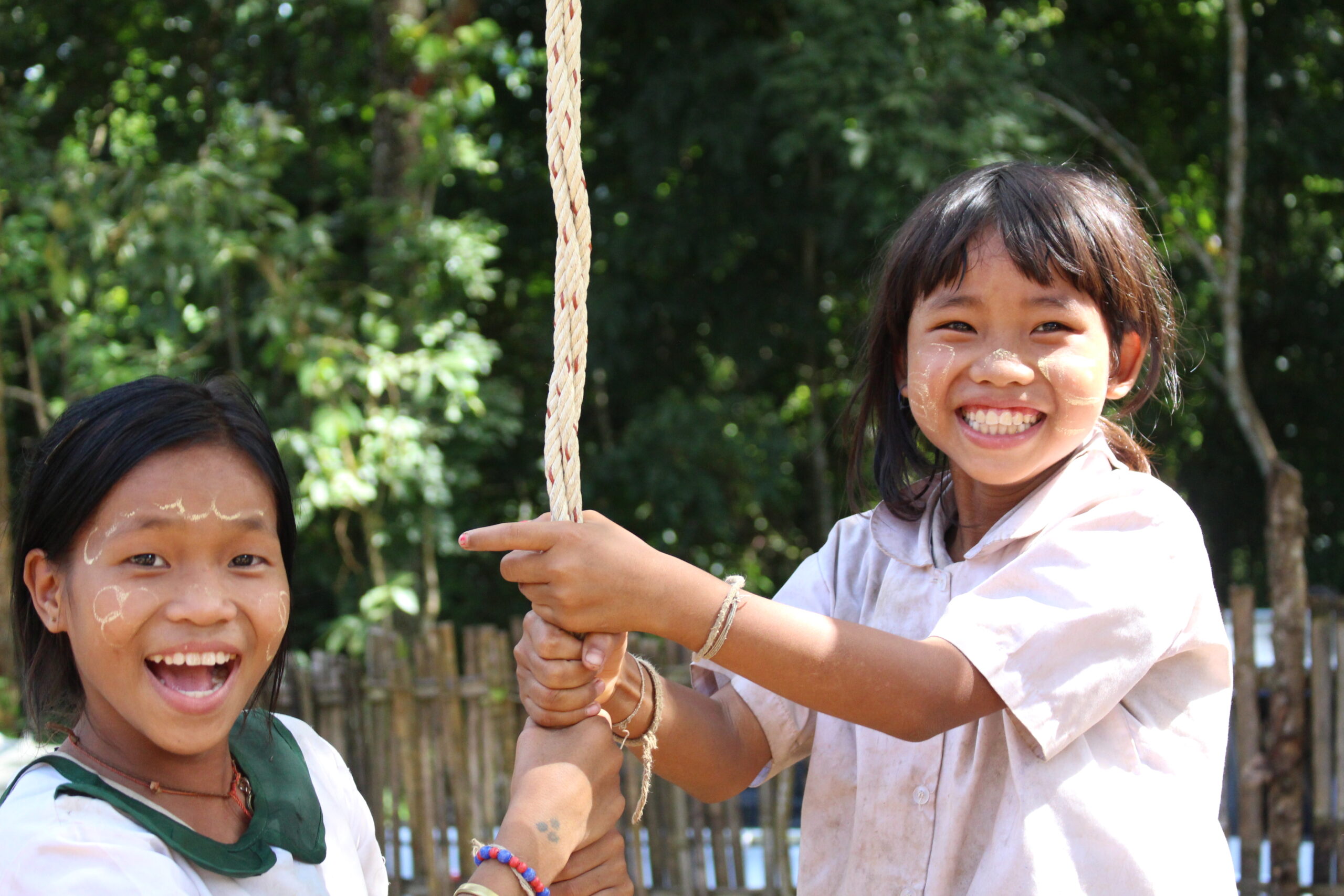
You see? Love links our supporters, teams and rural communities, guiding our vision and driving our work.
It allows our teams to be relentlessly dedicated to reaching the most challenging-to-access communities.
It inspires children in London, Berlin, and beyond to raise money for quality education each year.
It empowers mother's like Falina to push for their children's more prosperous futures.
Love is as formidable, essential and life-transforming as, well, education is.
Thank you for being part of our mission to love the world by providing sustainable access to quality education. We're deeply grateful for you.
From UWS, With Love
Education is key to helping children live Happily Ever Smarter
Nepal is one of the poorest countries in the world, with an economy largely dependent on tourism. As a result, government investment in education has been limited, tending only to reach communities based along main roads. However, many remote villages can’t be reached by road. This means that thousands of children from remote and marginalised communities are excluded from education. Literacy rates remain among the lowest in the world – just 10% of people in rural populations can read and write.
However, through improved access to quality education and better infrastructure provided by this project, we’re changing this story. Funded by the UK public and match funded by the UK government, our Happily Ever Smarter project is an example of what can be achieved through hard work and collaboration.
We’re thrilled to share that 18 months in, this project has significantly impacted the lives of 2,404 children so far. By the end of the project, we aim to bring that number to over 8,500 children.
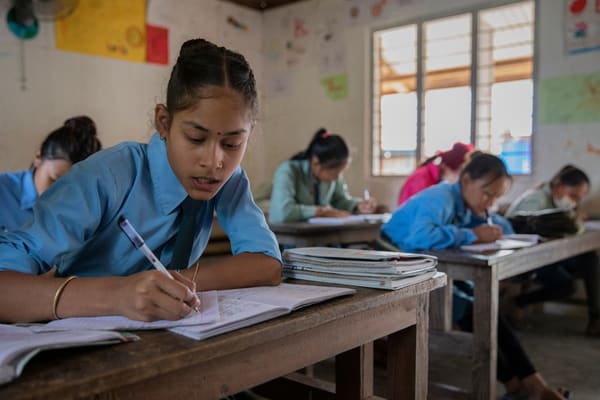
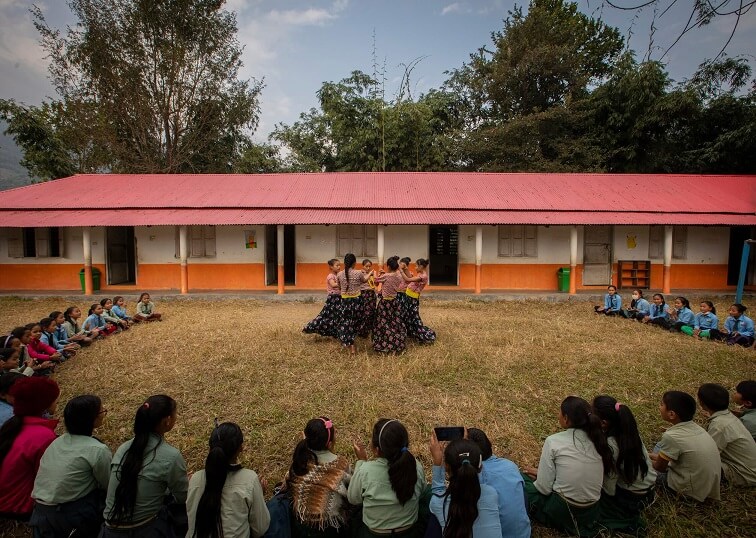
Meet some of the people making this work possible...
Every school we run is supported by an incredible team of talented and inspiring people.
“It's a contribution to rural Nepalese communities and the dreams of the children who will walk through the doors I’m helping to build."
Mina, Construction Worker
Meet Mina
– Construction Worker, Gulmi District, Nepal
Mina, a single mother raising two children, has worked tirelessly for the past six years in the UWS Nepal building team and most recently as part of our Happily Ever Smarter project. Her dedication and craftsmanship earn her commendations from everyone around.
“I receive so much praise for my work from the community and this motivates me to do better every day,” shares Mina with pride.
Mina’s aspirations extend beyond the construction site; they reach into the future she envisions for her children.
“As a single mother, life has been very difficult for me. I am thankful for my job and UWS Nepal for providing me with a means to support my family and their education.”
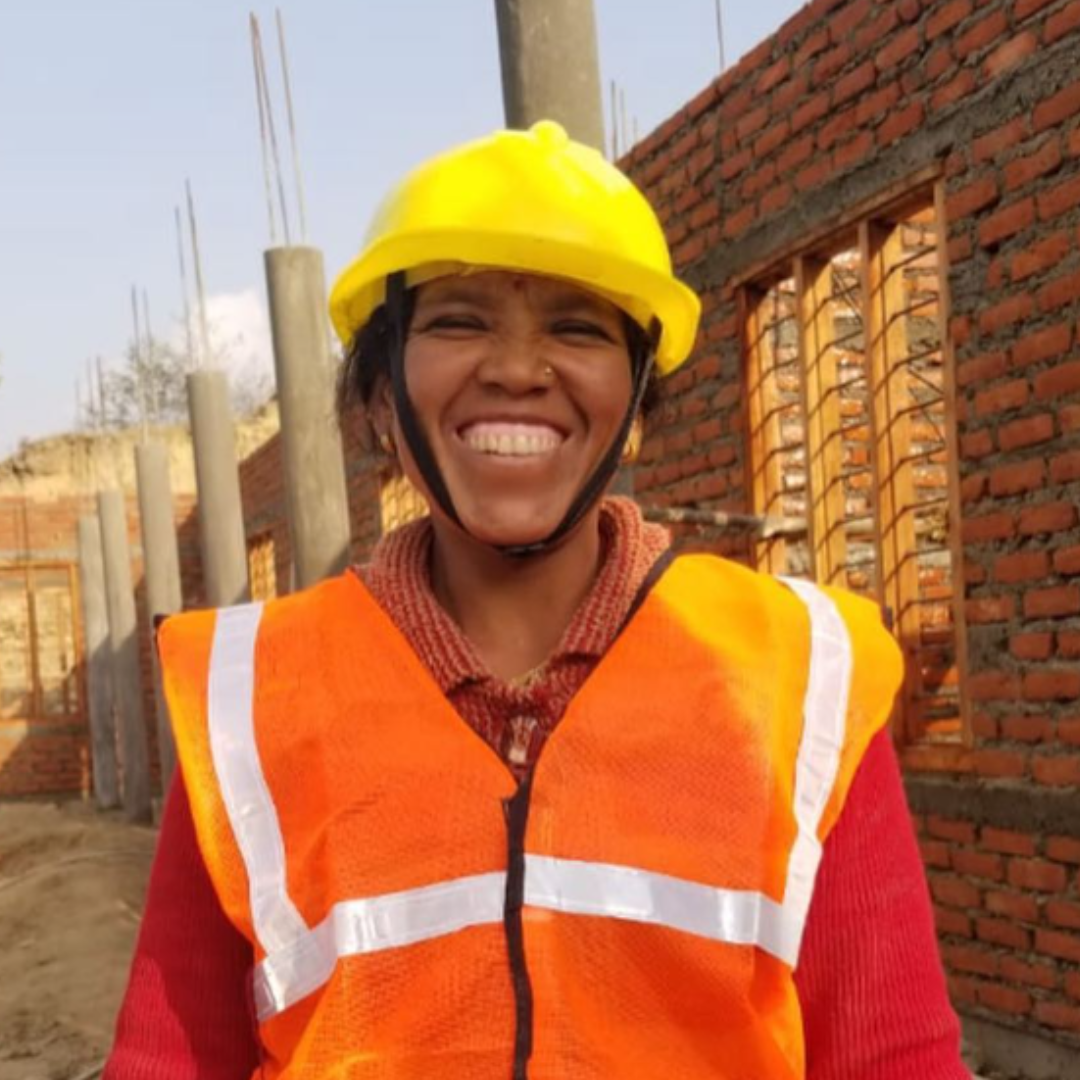
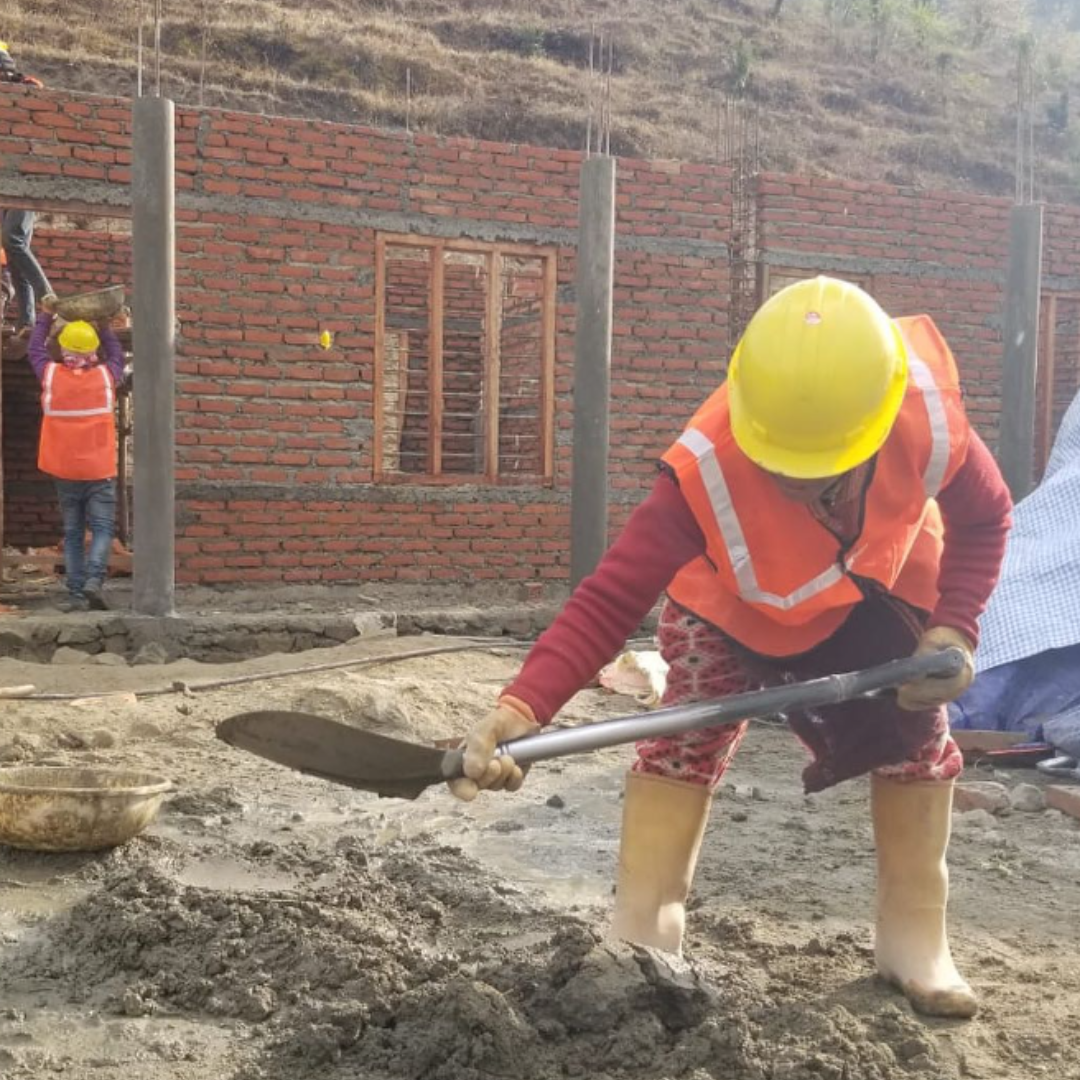
"School is like their second home, a place where all children, from different places and families, come to learn. Teachers need to make sure every child feels nurtured.”
Mausami Rai, UWS Teacher
Meet Mausami Rai
– Teacher, UWS Railey School, Nepal
High up in the Himalayas of eastern Nepal lies Railey village, a village which for generations did not have access to quality education. The nearest government school is a 3 hour, round-trip, walk away, up and down steep slopes, which became even more treacherous during the monsoon season. As a result, the majority of children had never been to school.
As part of our Happily Ever Smarter project, UWS aims to build or support schools in 60+ communities across Nepal over a three year period, including Railey village. UWS Railey School was built and opened in the heart of Railey village earlier this year.
Mausami Rai is a teacher here. She shared:
“To be a great teacher, it’s important to understand each child’s background and requirements to teach them accordingly. School is a place where children can express and explore themselves without any worries.”
